Kashmiri cuisine/ja: Difference between revisions
Created page with "カシミール人は食べ物との親密な関係を信じているため、すべての料理は手で食べられる。精神的で宗教的な老婆ですら、食事が終わってから耳の軟骨や骨髄の骨を噛み砕き、すべてをターリーの上に山積みにすることに何の躊躇もない。誰も眉一つ動かさない。カシミール人は、食べ物の種類や追加の盛り付けを断ることを失礼だと考える。追加の盛..." |
Created page with "* ''Adyav kheyiv chinih adyav kheyiv taki'' — 半分の人が大皿から食べ、半分の人が小皿から食べた。ひどく準備された夕食のこと。 * ''Akh chhiwyov masah byak hakah rasah'' — 一人はブドウの汁で酔い、もう一人は野菜の汁で酔う。富める者も貧しい者も、誰もが傲慢さを抱いている。 * ''Akh duda biyi maji kyut toak'' — 招かれざる客が、自分だけでなく母親のためにも(toak)..." |
||
| Line 913: | Line 913: | ||
カシミール人は食べ物との親密な関係を信じているため、すべての料理は手で食べられる。精神的で宗教的な老婆ですら、食事が終わってから耳の軟骨や骨髄の骨を噛み砕き、すべてをターリーの上に山積みにすることに何の躊躇もない。誰も眉一つ動かさない。カシミール人は、食べ物の種類や追加の盛り付けを断ることを失礼だと考える。追加の盛り付けを断ると死ぬと誓って、説得するためにかなりの努力をする。 | カシミール人は食べ物との親密な関係を信じているため、すべての料理は手で食べられる。精神的で宗教的な老婆ですら、食事が終わってから耳の軟骨や骨髄の骨を噛み砕き、すべてをターリーの上に山積みにすることに何の躊躇もない。誰も眉一つ動かさない。カシミール人は、食べ物の種類や追加の盛り付けを断ることを失礼だと考える。追加の盛り付けを断ると死ぬと誓って、説得するためにかなりの努力をする。 | ||
==食べ物に関することわざ{{Anchor|Food-related proverbs}}== | |||
==Food-related proverbs== | カシミール語にはことわざや慣用句が豊富である。食べ物に関する慣用句には以下が含まれる: | ||
* ''Adyav kheyiv chinih adyav kheyiv taki'' — 半分の人が大皿から食べ、半分の人が小皿から食べた。ひどく準備された夕食のこと。 | |||
* | * ''Akh chhiwyov masah byak hakah rasah'' — 一人はブドウの汁で酔い、もう一人は野菜の汁で酔う。富める者も貧しい者も、誰もが傲慢さを抱いている。 | ||
* | * ''Akh duda biyi maji kyut toak'' — 招かれざる客が、自分だけでなく母親のためにも(toak)一皿分を要求する。''Toak''はかつてカシミールで一般的に使われていた土の皿である。貧困や珍味を味わいたいという欲求から、物乞いや招かれざる人々が客の中に押し入ることがあった。これは、快く提供されたものに満足せず、さらに多くを要求する人に適用される。 | ||
* ''Akh duda biyi maji kyut toak'' — | * ''Apih hund gyav'' — 愚かな女のギー。気取った人。カシミール人は、裕福な人もそうでない人も、新鮮なギーを髪に塗っていた。 | ||
* | * ''Batah gajih ruhun'' — パンディットの炉にあるニンニクのように、あなたの存在は私にとってそのようなものだ。ヒンドゥー教徒の祖先は、宗教に専念していたため、媚薬効果のあるニンニクを食べなかった。 | ||
* | * ''Batook Poth'' — ''batook poth''(アヒルの尻)を食べたというのは、カシミール語でよく話す人の表現である。 | ||
* | * ''Chaanis haakhas chha paakuk haajat'' — あなたの''haakh''はしっかり煮込む必要がありますか?あなたの''haakh''はとても繊細で、ほとんど調理時間がかからないという意味で、皮肉な賞賛の一種である。 | ||
* ''Chaanis haakhas chha paakuk haajat'' — | * ''Chaantis animu mathun'' — おかゆで口を油まみれにする。ただ恥ずかしさのために飢餓を隠すこと。 | ||
* ''Chaantis animu mathun'' — | * ''Chayi tani ya gani magar tech gachi cheyn'' — お茶は、薄くても濃くても、熱いまま飲むべきだ。 | ||
* ''Chayi tani ya gani magar tech gachi cheyn'' — | * ''Dali Baate ti Khoji thool'' — パンディットにはダル、コジャには卵、彼らが好きな種類の食べ物。 | ||
* ''Dali Baate ti Khoji thool'' — | * ''Doori doori marts meethan, nishi nishi naabad tyathaan'' — 遠くから見るとコショウは甘く、近くにありすぎると砂糖は苦く感じる。 | ||
* ''Doori doori marts meethan, nishi nishi naabad tyathaan'' — | * ''Hardas gurus metras, sontah gurus shetras'' — 秋のバターミルクは友人のために、春のバターミルクは敵のために。したがって、秋の牛乳の方が質が良い。 | ||
* ''Hardas gurus metras, sontah gurus shetras'' — | * ''Hari tang tah zulahnai, muhuri tsont tah zulit'' — ナシがたった1カウリー硬貨の価値しかなければ皮を剥くべきではないが、リンゴが1ソブリン硬貨の価値があれば皮を剥くべきだ。カシミールの原住民はめったにナシの皮を剥かないが、リンゴの皮は常に剥く。リンゴの皮は消化しにくいと彼らは言う。 | ||
* ''Hari tang tah zulahnai, muhuri tsont tah zulit'' — | * ''Haruch gugaj tah Laruch gunas chhih barabar'' — 6月のカブとラル地方のヘビは等しい。原住民はどんな理由があっても6月のカブは食べないが、''Gunas''は主にラル・パルガナで見られる丸頭のヘビで、その噛みつきは一般的に致命的である。 | ||
* ''Haruch gugaj tah Laruch gunas chhih barabar'' — | * ''Majji bhatee'' — 母親が作った食べ物が最高の食べ物だ。 | ||
* ''Majji bhatee'' — | * ''Phata Wangun'' — 破裂したナス、文字通り、自分のためにならないほど賢すぎるずる賢い若者。 | ||
* | * ''Rogan o zafaran az Pampur, sag az Latapur brinj az Nupur; barrah az Nandapur. Puttu o mahi az Sopur; mong az Kralapur. Arad az Khampur. Shir az Shadipur. Angur az Repur'' — ギーとサフランはパンポール、野菜はラタプール、米はヌプール、ラムはナンダプール、''pattu''と魚はソポール、ダルはクララプール、小麦粉はカンプール、牛乳はシャディプール、ブドウはレプール。 | ||
* ''Rogan o zafaran az Pampur, sag az Latapur brinj az Nupur; barrah az Nandapur. Puttu o mahi az Sopur; mong az Kralapur. Arad az Khampur. Shir az Shadipur. Angur az Repur'' — | * ''Talwe peyi na tangah'' — 天井からナシが落ちてくることを願うのは無駄な希望だ。 | ||
* ''Talwe peyi na tangah'' — | * ''Chaki pechni ras, yath poshi tas'' — 誰かが通常持っていないものについて自慢し続けるとき。 | ||
* ''Chaki pechni ras, yath poshi tas'' — | * ''Khar kya zani zaffran kya gow'' — ロバはサフランの味を理解できない。 | ||
* ''Khar kya zani zaffran kya gow'' — | * ''badhshah saab khar ne khewan zab, yeli poras teli kheyi zab'' — 通常、食べ物を受け入れない感謝しない人に対して言われる。 | ||
* ''badhshah saab khar ne khewan zab, yeli poras teli kheyi zab'' — | |||
<div lang="en" dir="ltr" class="mw-content-ltr"> | <div lang="en" dir="ltr" class="mw-content-ltr"> | ||
Revision as of 22:50, 12 June 2025



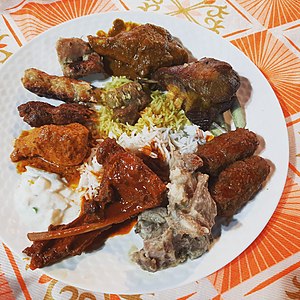
| この記事はシリーズの一部である |
| インド料理 |
|---|
 |
|
|
カシミール料理は、インドのジャンムー・カシミール連邦直轄領にあるカシミール渓谷のカシミール人に伝わる伝統的な料理法を指す。この料理は、中央アジアやインド亜大陸の近隣地域から強い影響を受けている。米は古代からカシミール地方の主食であった。カシミール語で「パンとバター」に相当する言葉は「ハーク・バッテ」(青菜と米)である。
カシミール料理は一般的に肉が多めである。この地域は、インド亜大陸で一人当たりのマトン消費量が最も多い。カシミール料理の大部分では、パンは食事の一部ではない。パンは通常、朝または夕方の紅茶と一緒にのみ食べられる。典型的なカシミール料理は、たっぷりの米(約250g)、マトン(100g)、油で調理された野菜(約100g、主に青菜)、そしてヨーグルト(50〜250g)で構成される。
イスラム教徒による野菜、羊肉、自家製チーズ(パニール)、豆類の調理法は、イスラム教徒がアサフェティダの代わりにタマネギ、ニンニク、エシャロットを使用することを除けば、パンディットのものと類似している。パンディットは肉に子羊または羊を選ぶのに対し、イスラム教徒はヤギを好む。カシミール語で「マワル」と呼ばれるケイトウの花は、特定の料理に使用される赤い食用色素を作るために茹でられる。カシミール・パンディット料理では、穏やかな辛味のあるカシミール産赤唐辛子の粉末を香辛料として使用し、また、ラタンジョットをローガン・ジョシュのような特定の料理に色を付けるために用いる。カシミール・イスラム料理では、唐辛子の使用量は控えめで、大量の食事では辛い料理を避ける。カシミール・イスラム料理では野菜カレーが一般的で、肉は伝統的に高価な贅沢品とされている。肉は米、少量の野菜、サラダと共にイード・アル=フィトルのような特別な行事で調理される。
世界的な人気と都市への拡大
カシミール料理は世界中で高く評価されており、ローガン・ジョシュ、グシュタバ、ヤクニ、カフワといった代表的な料理が世界中のグルメメニューに登場している。ロンドンやドバイのフードフェスティバルからニューヨークやトロントの高級レストランまで、カシミールの豊かで香り高い風味は国際的な人々に受け入れられている。
インド国内では、カシミール料理は主要な大都市で存在感を増している。デリー、ムンバイ、ベンガルール、ハイデラバードには高級カシミール料理レストランが開店し、ディアスポラや本格的な地方料理を求める食通の両方に対応している。これらの店は、カシミール人コミュニティのメンバーが経営しているか、ワズワーンを専門とするシェフが監修していることが多く、この地域のユニークな美食の伝統を保存し、促進するのに役立っている。
この成長は、料理インフルエンサー、YouTubeのシェフ、そしてカシミール料理の複雑な調理法と文化的意義を紹介するキュレーションされたポップアップイベントによってさらに支えられている。
カシミール料理の歴史
マハーバーラタの時代から紀元前516年のダレイオスによるカシミール(ガンダーラの一部)のイラン侵攻、シュリーナガルを建設したマウリヤ朝、クシャーナ朝、そして1398年のティムールによるカシミール侵攻まで、カシミール人の文化と料理は、南アジア、ペルシア、中央アジアの料理に、現地の革新と食材の利用可能性が混ざり合ったものと関連付けられている。Kababという用語はアラビア語起源、kormaはトルコ語のルーツを持ち、rogan josh、yakhaen、ab gosht、riste、goshtabhはペルシア語源である。
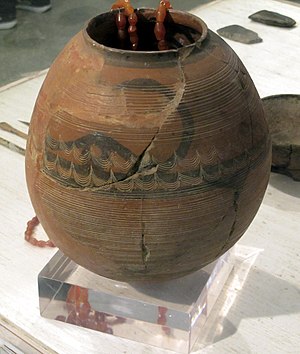

初期史
太古の昔、カシミール渓谷は広大な山岳湖であったという伝説がある。土壌には淡水魚や化石カキの残骸が含まれ、黒いクワイの殻は渓谷の標高457メートル上方の地中に埋められた層から見つかることがある。
旧石器時代
カシミールと外界との融合の過程は、イランからの原始的な蛇と火の崇拝の輸入から始まった。旧石器時代以来、蛇は崇拝され、来世への備えとして昆虫を供えて墓に埋葬された。さらに、蛇や他の動物に敬意を表して、聖地や墓に穀物を撒いた。2005年にDr. Mamtaz Yatooによって発見されたボンマイ・ソポレ考古学遺跡からは、カシミールで発見された初の先史時代の岩石彫刻が確認されている。この後期旧石器時代の彫刻は、先史時代の人々の狩猟と獲物との関わりを描いている。パハルガムのオベラ渓谷における考古学者による最近の調査では、動物を捕獲するために使用された片刃の石器を含む、旧石器時代の石器が発見されている。
新石器文化
新石器時代に続く巨石文化以前から、小麦、大麦、レンズ豆の栽培の証拠がある。紀元前2500年以降、カシミールのカシム・バーグでは、大量の穀物貯蔵や小麦、大麦、アワの穂軸の形で、農業の明確な証拠が発見されている。カシミール渓谷には、おそらく気候が暖かくなった紀元前3000年という早い時期にさかのぼる、いわゆる北部新石器時代の複数の遺跡がある。ペートプーラン・テンの遺跡からは、この初期集団のより広い接触網と、中央アジアの山々を越えてアワが著しく深く移行したことが示唆されている。ペートプーラン・タンのレンズ豆のサンプルから得られた年代範囲は、この地域で最も初期に年代測定された豆類作物の一つである(紀元前約2700年)。渓谷は標高的には中央アジアの他の山間部の農牧地帯に匹敵するが、カシミールはわずかに緯度が低いため、より高緯度で北方の地域での栽培を可能にする形質の必須な遺伝子導入なしに作物を栽培できる地理的限界として渓谷が存在していた。
シュリーナガル地区にあるブルザホームの新石器時代遺跡で回収された道具の範囲は、当時の人々が耕作具の知識を持つ熟練した狩人であったことを示している。石の炉は、穴の入り口付近の地表で発見されている。II期(土器新石器時代)の構造物からは、中空の台座を持つ皿と球状の土器が発見されている。湾曲した刃を持つ長方形の収穫具も回収されている。新石器時代の人々の芸術的な行動は、人間、犬、太陽の経路図が描かれた狩猟の場面で確認されている。長方形の断面を持つ乳鉢と乳棒は、現在のカシミール人が使用しているものと同じ火山岩で作られている。レンズ豆の存在は、ブルザホームの人々が中央アジアと広範な接触を持っていたことを説明している。それを扱うための2つの穴を持つ収穫具(石製と骨製)は、中国との接触を示している。
シュリーナガルから南西41kmにあるグフクラル新石器時代遺跡では、入植者が野生動物の狩猟と動物の家畜化に従事していたことが考古学者によって確認されている。当時知られていた動物は、野生のヒツジ、野生のヤギ、野生のウシ、アカシカ、オオカミ、ヒマラヤアイベックス、クマであった。食料(肉と穀物の両方)のローストは、住居の穴の中で炉や暖炉が見つからなかったため、屋外でのみ行われた。突き刺し具は、動物が殺され皮を剥がれた後、肉に切り込みを入れたり、肉を裂いたりするために使用され、スクレーパーは肉から脂肪を削り取るために使用された。新石器時代の居住のフェーズIBでは、ウシや一般的なエンドウ豆などの新たな追加が見られた。ブタ(Sus scrofa)と魚は後期新石器時代に登場した。ノウサギ(Lepus)、ハリネズミ、齧歯動物、ビーバーの骨も回収されている。
バラームラから東に7キロの地点にあるカニスプールでエンマー小麦(Triticum dicoccum)作物が存在することに基づいて、ハラッパ人と新石器時代のカシミールとの接触が示唆されている。紀元前8世紀頃のアーリア人のカシミールへの移住により、火の崇拝の習慣は、調理された米の男根の象徴のような慣習を通じて、カシミールの生来の宗教文化的構造に組み込まれた。地元の儀式であるvayukは、イラン式のFarvadinに再び近い。月の特別な日には、カシミールのイスラム教徒は故人を偲び、墓を訪れ、米のパンを配る。
インド・ギリシャ時代とクシャーナ時代

ビジベハラの北にあるセムタンからは、インド・ギリシャ時代(紀元前200年~紀元1世紀)の土製のthalis(鍋)が発見されている。Handis(金属製の鍋)、平皿、高台付きの杯、縁のある鉢が、ハーワン、カニシュプール、セムタンの発掘現場から多数報告されている。カニシュプールでは調理鍋が発見されている。カニシカの硬貨を含む多数のクシャーナ朝の硬貨がカシミール渓谷から回収されており、ヴィマの祭壇で犠牲を捧げる王のモチーフを模倣し続けている。
クシャーナ時代は二毛作パターンが特徴であり、新石器時代以降の人口減少からの回復に伴う農業慣行の変化を示唆している。Vitis vinifera(ブドウ)、Emblica officinalis(インドスグリ)、Ziziphus nummularia(野生のナツメ)、Juglans regia(クルミ)、Prunus amygdalus(アーモンド)の発見は、園芸と採集が居住者の食生活において重要な役割を果たしていたことを示唆している。カニシュプール出土のクシャーナ時代の遺物はオオムギが主体であるのに対し、小麦がより一般的なセムタンとは対照的である。
クシャーナ朝の歴史は、クシャーナ朝の支配者時代(紀元1世紀~紀元450年)からローマとカシミールの間に接触があったことを伝えている。カシミールはギルギットとヤシン渓谷を経由してタシュクルガンで南のシルクロードに接続されていた。ローマへの主要な輸出品はサフランとドルミア・コスタス(kutha)であった。ドルミア・コスタスはローマで様々な目的で使用され、その中には食品の香り付けやワインの調味も含まれていた。
ヒンドゥー王朝
カシミールのカルコータ朝と中国の唐(618年~907年)朝廷の間には軍事的な接触があった。中国の唐王朝がチベット軍を撃破し、722年10月に小パルールに入った際、カシミールはギルギット渓谷に駐留する中国軍を維持するために不可欠な農業物資を提供したとされている。
カシミール・スルターン朝(1346年~1580年代)
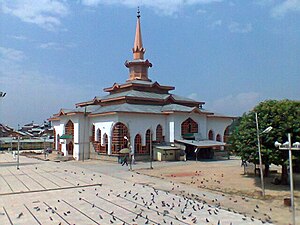
イスラム教がアラビアから直接カシミールに伝わったわけではないため、自然とイランと中央アジアの混合的な影響を帯びていた。同様に、カシミール・ヒンドゥー教徒は、インドの正統派ヒンドゥー教徒を驚かせたであろうことを行っていた。彼らはイスラム教徒が持ってきた水を飲み、イスラム教徒の船で調理された食物を食べ、イスラム教徒の乳母が子供に授乳することも許されていた。そのため、リシ信仰は、菜食主義、動物への不傷害、食物におけるニンニクとタマネギの使用の abstention を通じてヒンドゥー教と同一視された。伝説によると、ヌンド・リシは乾燥したタンポポの葉を食べて生活し、ラル・デッドは厳格な菜食主義を説き、実践した。
さらに、カシミール最後の主権者であるユースフ・シャー・チャクが1586年にアクバル皇帝と象徴的な主権を認める条約に署名した際、その条件の一つは、造幣所、サフラン、狩猟が帝国管理下に置かれることであった。
ムガル帝国時代(1580年代~1750年代)
シュリーナガルでは、貧しい人々の食事はギー、牛乳、牛肉、タマネギ、ワイン、ピクルス、酢で作られていた。米、魚、そして多数の野菜がムガル時代には主食であった。バターや脂肪は、寒い環境のため危険であると考えられていたため、料理にはあまり使われなかった。南カシミールの人々は川の水を飲まなかった。彼らは温かく、心地よく、消化しやすいダル湖の水を飲んでいた。
1635年から1636年にかけて、シャー・ジャハーンの治世中に、マイシュマでシーア派とスンニ派の両派の集団が桑の実を食べていた際、一部がムハンマドに対して不適切な言葉を使ったと告発され、激しい紛争が勃発した。1641年には前例のない洪水とその後の飢饉により村々は荒廃した。シャー・ジャハーンはシュリーナガルの困窮者に分配するため、スベダールのタルビヤット・ハーンに3万ルピーを送り、また、渓谷に5つの施設を開設して困窮者に無料で食料を提供することを命じた。
シーク教徒の支配(1819年~1846年)
牛の屠殺は死刑に処せられる犯罪と宣告され、牛を殺した罪で告発された多くの人々が公開処刑された。支配者の近視眼的な政策により、カシミールは深刻な農業危機に見舞われた。シーク教徒の支配者は、稲作生産高の半分を政府の分け前として課した。カシミールの人口は1822年~1823年の80万人から1835年には12万人に減少した。
ドグラ家の支配(1846年~1947年)
粗い米とhaakhが主食であった。不均一な地形や灌漑施設の不足により稲作が制限されていた地域では、小麦とトウモロコシが主な食料であった。カシミールの一部の地域では、singhara(菱の実)などの水生植物を食料としていた。
カシミール産のリンゴは、クーリーによって背負われ、12日間かけてイギリス領インドのラーワルピンディーまで運ばれた。
1878年~79年の飢饉は壊滅的であった。また、飢えに駆られた人々が魚を捕獲して食べることは、マハラジャ・ランビール・シングの治世中の法令によって違法とされた。しばしば、牛を殺した者は油で煮られ、公共の場所の棒に固定されたフックに吊るされた。人々は荒れ地を所有する権利を持たず、村人が持っていた唯一の権利は、そのような土地に木を植えることができ、土地ではなく木の所有者となることであった。牛乳とバターは、役人によってgujjars(遊牧民の牧夫)からしばしば無償で奪われた。

古代カシミール文献に登場する食品

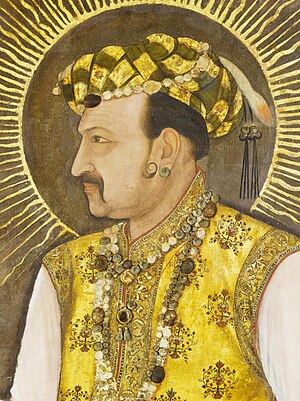

古代カシミールの聖典・年代記・旅行者の記録に言及されている食品には以下のようなものがある:
- 米 - 飢饉時には他国から輸入することも可能だった。パタンジャリの『マハバシャ』によれば、紀元前150年頃にはすでに渓谷で米が栽培されていたことが明らかになっている。スルタン・ザイン=ウル=アビディンはダル湖の水をマール運河に引き込み、それをシャディプルまで延長し、ジェーラム川とインダス川の合流点で排出させた。これらの灌漑工事と広大な地域の耕作への開拓により、カシミールは米生産において自給自足となった。地元の人々はデウスールの熱水を神聖なものと考え、何かの事業が成功するかどうかを知りたいときは、土製の器に米を入れ、水が入らないように口をしっかり閉じ、それを聖なる泉に投げ入れるべきだと言った。もし浮き上がってきた米が茹でられていれば幸運な前兆と見なされ、そうでなければ不吉とされた。
- ピラウ - 黄色いピラウ、黒いピラウ、ショラ・ピラウなど。
- ビカバッタ - 米、ヤギの脂、水で構成される料理。
- 砂糖とサトウキビを混ぜた米
- パン - 17世紀初頭までは、naan/tsoetを食べる習慣はなかった。
- 牛乳 - 牛乳と恐らく水牛乳が消費されていた。
- バター
- イチゴ - イングランドの最高級品と競えるほどだった。
- 黄色いラズベリー
- マスクメロン - アクバルの許可により、作物は後にカシミールから輸入された。
- グアバ - カシミールのグアバはジャハーンギールによって「並」と評価された。
- モモ - 7月に熟した。
- その他の様々な果物 - (リンゴ、クラブアップル、ナシ、モモ、アンズ、サクランボ、クワ、メロン、スイカ、グリーンプラム、グーズベリー、カラント、ラズベリー、サワーチェリー)。
- 様々な野菜 - (赤カブ、ワイルドパースニップ、ラディッシュ)。
- ルバーブ(pambahak) - カシミールを取り囲む山々で育った。ヒンドゥー教徒もイスラム教徒も茎を好んだ。
- カブ - ハリプールのカブ(gogjee)は渓谷で最高のものと言われた。
- ニンジン - ニンジン(gazar)はイスラム教徒の住民に食べられたが、ヒンドゥー教徒には食べられなかった。
- 新ジャガイモ
- リーキ - リーキ(gaudapraan)は渓谷のヒンドゥー教徒には食べられなかった。
- アーティチョーク
- アスパラガス - 太い茎で。
- レタス
- トマト - 真紅色。
- ディムブ - カシミールのダル湖とアンチャル湖でのみ見られる野菜。

カシミールの肉屋(1900年頃) - 雄羊の肉 - 肉(mesa)は一般的に揚げられ、時には香辛料が効かせてあった。ナンディプルのマトンはカシミールで最高級と言われた。
- ヨーグルトで調理された肉
- アヒル
- ハト
- 牛肉 - カシミールの神秘家ヌンド・リシ、またはシェイク・ヌール・ウド・ディン・ワリは、牛肉(moshi)を食べてから人食い鬼の貪欲だと不平を言う説教師に対する軽蔑を彼のshruksの一つで表明した。スルタン・ギヤス=ウド=ディン・ザイン=ウル=アビディンは、ヒンドゥー教徒の宗教的感情に配慮し、州での牛の屠殺を禁止していた。
- 馬肉 - カシミールでは好んで食べられた。
- 豚肉 - 11世紀には、家畜のブタ(gramya sukara)がカシミールで何ら問題なく食べられていた。ブルザホームの試掘では、ブタの顎の断片が発見されている。
- 家禽 - ロラブ渓谷は最高品質の家禽で有名だった。カポンの飼育もカシミール人には知られていた。
- チキンスープ(shurbaは文字通り塩味の水という意味で、baは水を表すaabの逆)。
- その他の食用鳥
- 犬肉 - ドム系の民族によって調理された。
- ハンドゥヒツジ - 繊細で甘い風味があり、栄養価が高かった。
- 雄ジカ - ウーラー湖で追い詰められた。
- 網脂 - インドの他の地域でghee(澄ましバター)の代わりに、動物の脂の献物が犠牲の火に供えられた。
- コイ - クセーメンドラの『サマヤ・マートリカ』に言及されている。
- 魚のスープ - 女性に夢中の男性が媚薬的な活力を維持するために食べた。

タイムズ・オブ・インディアのシリーズより、1930年のカシミール人女性の画像。カシミール人女性は色白で、明るいミルクとサフランの頬を持つと認識されており、ヨーロッパの旅行者によってしばしば欲望の対象として描かれた。 - マス。
- ダニューブサーモン
- 鶏(kukkuta) - カシミール人のお気に入りの料理は、鶏とナスを一緒に調理することだった。
- 蜂蜜
- ゆで卵 - 卵はギルギットと小チベット(ラダック)から運ばれてきた。そこではより豊富に入手できた。
- ピルチャム - オムレツのような調理法。
- マスラ - レンズ豆の一種。
- サムドガ - ムング豆。米とsamudgaだけを食べることはケチだと知られていた。
- その他の豆類 - (エンドウ豆やソラマメを含む)。
- パルパタまたはパパラ - 現代のpapad。豆類から作られる別の種類の食品。
- クシラ(キール) - 牛乳で煮た米。
- マチャマ - 米、野菜、レーズン、着色料、砂糖からなるカシミール人が食べる料理。
- クルミ - 飢饉時にshali米が高価になったため食べられた。
- ピスタチオ
- サトウキビ - マータンド周辺の土地にはこの作物が植えられていた。
- ブドウ - 玄奘三蔵によれば、インドではカシミールでのみ栽培されており、カルハナによれば天国でも珍しかった。ペルシアの作家アブル・ファズルは豊富にあると考えたが、より上質なものは珍しかった。ウォルター・R・ローレンスはライプールの州立ブドウ園の白ブドウと赤ブドウを称賛した。外国品種では、husainiとfakhri品種はホラサン産で、ペルシアで最高とされた。
- 未熟なブドウ(kur) - カシミール人はそれで優れた酢を作った。
- ニンニク - カルハナによれば、それを食べた何人かのBrahmanaは追放された。ニンニクとタマネギは古代カシミールでは媚薬と考えられていた。
- ザクロ - 19世紀後半にはすでに豊富に存在していた。
- ホーリーバジル
- 塩 - 貴重品であり、クセーメンドラによれば裕福な者だけが消費した。カシミールの市場では2種類の塩が見られた。パンジャブ産の岩塩と、ラダック産のbota nunと呼ばれる粉塩。

コング(カシミール産サフラン)、GIタグ。 - 澄ましバター - ランプはギーで作られた。それは訪問販売人が一軒一軒回って販売していた。

ドゥードパトリのマスタード畑。マスタードオイルはクルミ油に取って代わって以来、カシミール料理の非常に重要な一部となっている。 - 油 - 200年以上前に建設された木製の油圧搾機がカシミールで稼働している。1940年代半ばまで、シュリーナガルには16の製油所が稼働していた。昔はBote Chireと呼ばれる大量の乾燥アンズがラダックからカシミールに輸入され、カシミールの油圧搾機でその種子から油が搾り取られた。菜種油は食用に最適とされ、クルミ油やアーモンド油も使用された。19世紀から20世紀にかけて、カシミールではマスタードの栽培が大幅に増加し、クルミ油の使用は大幅に減少した。
- 金粉
- ヨーグルト
- 半熟の大麦
- 大麦から作られたパン(apupa)とケーキ(pistaka) - 1年の特定の日は、大麦が畑で熟する時期の祭りとして祝われた。
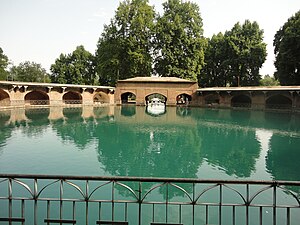
ベリナグの湧水。 - お茶 - 中国領タタールとチベットを横断するキャラバンによってカシミールにもたらされた。
- ビール - カシミールの博学者アビナヴァグプタにとって、アルコールはシヴァの外的本質であった。アルコールなしには、喜びも解放もなかった。飲酒はバラモンのsautramani犠牲、戦士の大きな戦いの際、農民の農業の際、大きな家族の祝賀、息子の誕生の際、結婚や友人の集まりの際、そして奴隷の火葬儀式の終了時に認められている。彼の解説者ジャヤラタにとって、実践者はある種のbhairavicな偉大さのために飲むべきであり、貪欲のために縛られた動物のように飲むべきではない。最高の飲み物は常にあり、平均的な価値の飲み物は節目に、最悪の飲み物は月に一度だけであり、一ヶ月を超えると彼は縛られた動物になる。ホップもカシミールで育ち、原料が優れた液体に加工される工場が近くにあった。
- 小麦ビール
- ミード(蜂蜜酒)
- ラム酒 - 糖蜜から作られた。
- ワイン - カシミール語でmasと呼ばれる。カシミールは、インドで唯一ブドウの果汁からワインが作られた地域であり、これは果物の不足よりもむしろその酸性度によるものとされている。ヘレニズムの影響を受けたワイン文化が紀元初期のカシミールで栄えた。1896年にフランス人アルベール・フーシェがバンディポラ県のブラール村近くで発見した、特徴的なガンダーラ様式のラクシュミー女神像のビーズリングには、ブドウの房と葉が見られる。2世紀前半の仏教文献である『ムラサルヴァスティヴァーダ・ヴィナヤ』には、僧侶が北西を旅し、yakṣaが彼らにブドウを贈る場面があり、それはカシミール産で、明らかに珍しいものであったと言われている。仏陀は、燃える炭で清めてから食べることができ、人々はそれからジュースやシロップを作ることもできると説明している。アビナヴァグプタにとって、ブドウから得られるアルコールは最高の輝きであった。彼は故郷カシミールのワインをmahabhairava(水銀の本質)と称賛した。ジャヤラタは、その効能がかなり限定されるという理由で、他の成分と混ぜることに注意を促している。ラリタディチャはワインにひどく酔いしれ、大臣たちに、もし自分の都市の美しさを増したいなら、アルチョン・フン族のシュリー・プラヴァラセーナ王が建設した都市プラヴァラプラを焼くべきだと告げ、彼の命令は無視できなかった。初期のスルタン朝時代には、正統派社会から強く非難されていたにもかかわらず、ワインの製造と飲酒が禁止されていなかったことを示す多くの言及がある。ヒンドゥー教の祭りでは、一般の人々もバラモン僧侶も同様に酔っ払った状態で見られるのが一般的だった。イスラム教のアルコール禁止にもかかわらず、これらの祭りに参加したイスラム教徒も自由にワインを飲んだ。ザイヌル・アビディンは節度を持って飲んだが、ハイダー・シャーは重度の酒飲みだった。シカンダル・ブトシカン、または「偶像破壊者」(1416年頃)はカシミールでのワインの販売を禁止した。在来種のブドウは一般的にポプラの根元に植えられ、50フィートまたは60フィートの高さまで伸び、豊かに実を結んだ。10月にブドウを収穫した後、春まで浅い土器に保管され、その後ワイン、酢、ブランデーの製造に用いられた。1815年、初期のワイン作家アンドレ・ジュリアンはカシミールワインをマデイラと比較した。マハラジャ・ランビール・シングはフランスのボルドーからブドウの木を導入し、1900年にカシミールを訪れたマリオーン・ドゥーティという女性は、メドックとバルザックの両方が滋養があり、味も心地よいと書いている。Anguriとqandiは歌手たちの愛飲品だった。
- マイレイヤワイン - 樟脳で香り付けされたスパイシーなワインで、果物や花をベースにした天然の砂糖から作られた。
- アサヴァワイン - 様々なハーブの煎じ液または冷浸液をdhataki(woodfordia fruticosa)の花で発酵させたもの。
- 新酒 - ヒンドゥー教徒はブドウの果汁を絞り、漉し、4、5日間太陽の下に置き、それから飲んだ。
- 甘口ワイン - マデイラのように。熟成とともに品質が大きく向上すると考えられた。
- 果実酒(madapan) - ナシ、リンゴ、クワから作られた。
- ブランデー - ワインから蒸留された。
- 酢 - カシミール人は様々なピクルスをそれで作ったが、ジャハーンギールによれば、最高のものはニンニクだった。
- 小麦粉のケーキ - 上質な小麦粉は高価になることがあった。
- ブドウからの蒸留酒 - 酒(mrdvika)は呪文と祝福とともに飲まれた。
- チョウセンアサガオ(Thorn-Apple)からの蒸留酒
- ゴマ - そこから油が抽出された。
- ショウガ - ジョナラージャは彼の言葉(乏しい)を乾燥したショウガの中の水に例えている。
- 粗糖
- 肉のケーキ
- 魚
- 乾燥食品
- イラの花(飲み物)
- 青野菜
原材料と調味料
肉

カシミールでは、鶏肉、魚、狩猟肉の他に、羊肉(成熟した羊の肉)またはヤギ肉のみが食される。羊の75%以上が交配種で、一般的にカシミールメリノと呼ばれ、肉と羊毛の両方に利用される。バッカルワール(遊牧民の牧畜民)のヤギは、肉質において世界最高級とされる珍しいカガニ種に属する。
牛肉はカシミールの町や村で消費されており、その手頃さからより多く食べられている。一部の村では、ワズワーンの宴会中、牛肉を食べる人々と羊肉を食べる人々が分けられて座る。「小さな肉」(マトン)を食べる人々は上流階級で洗練されていると見なされ、「大きな肉」(牛肉)を食べる人々は下層階級と見なされるという階級意識が存在する。北インド最大のウサギ繁殖場は、カシミールのバラムラ地区ウッサン村の6ヘクタールの土地に広がっている。一般の人々の間で、羊肉やヤギ肉の代替としてウサギ肉の消費が人気を集めている。ウサギ肉は赤身で栄養価が高く、心臓病を持つ人々も食べる。
カシミール固有のガチョウ(Kashmir Aenz)は、インドで最初にして唯一認められた家禽種である。渓谷でのガチョウの飼育は、ウォルター・R・ローレンス卿が著書『カシミール渓谷』で述べているように、古代にまで遡る。シュリーナガルでは、ガチョウは主にバトマルーとラールチョークで、村の飼育者からガチョウを買い取り、生きたまままたは屠殺して市内で販売する業者によって売られている。裕福な家庭では、ガチョウのピクルスも作られ、冬のために保存された。
魚類

1899年、ベッドフォード公爵はイギリスから1万個のマスの卵を送るのを支援したが、輸送中にすべて死滅した。翌年、スコットランドから第2便が到着した。ニジマスとブラウントラウトはカシミール渓谷によく適応し、固有種のスノウトラウトは引き続き繁栄している。地元ではalegaadとして知られ、渓谷全体の止水域と流水域の両方で見られる。アナントナグ地区だけでも137の個人養魚場があり、同地区は「インドのトラウト地区」と宣言された。
卵
カシミールはヨーロッパと類似した地理的・気候的条件を持つため、養鶏場はヨーロッパの基準に設定されている。パーマカルチャーや無耕起栽培の技術を用いて、放し飼いの卵が毎日販売されている。人々はカリンガブラウン、ヴァンラジャ、カシミールコマーシャルレイヤーなどの鶏の品種を集めて、オーガニックのブラウンエッグを定期的に供給している。カシミールダック(batook)は、渓谷のすべての地区で卵のために飼育されており、バンディポラ地区が最も多く、次いでクプワラ、バラームラ、シュリーナガルなどが続く。
カリージキジ(wan kokur)は、1回の産卵で6個から10個の卵を産み、オリーブグリーンの殻のまま半熟で、セロリソルトを軽く振りかけ、バターを塗ったトーストとともに提供するのに最適である。
穀物
カシミールの人々は、香ばしいムシュク・ブジを含む様々な種類の米を食している。この米はカシミール渓谷の高地で栽培されており、2022年2月には地理的表示(GI)タグを取得した。この炊き上がった米は独特で、味、香り、豊かな官能特性が調和している。地元でZaag Battと呼ばれるカシミール赤米は、パキスタンとの国境にあるタングダールという小さな村で栽培されている。この小さな無精米の穀物は、その優れた食感と味から求められている。2009年には、この地域の農家が初めて伝説的なバスマティ米を収穫した。
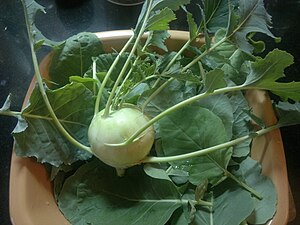


野菜

最も重要で頻繁に使われるカシミールの野菜は、haakh(コラードグリーンまたはケール)、monj Haak(コールラビ)、tsochael(ゼニアオイ)、bamchoont(マルメロ)、kral mound(ナズナ)、saze posh(タチアオイ)、nadur(レンコン)、praan(エシャロット)、aubuj(スイバ)、mawal(ケイトウ)、wushkofur(カンフル)、tila gogul(マスタード)、gor(ウォーターチェスナット)である。ダル湖の浮き野菜園は、世界で2番目に大きい卸売市場である。老若男女の男性たちが、木製のボートの上で、ふっくらとしたカボチャやヒョウタンの値段を議論しながら、タバコや水タバコを分け合っている。カシミールの水は甘く、それが野菜の味や風味に影響を与えている。販売品には、トマト、ニンジン、キュウリ、カブ、ウォーターチェスナット、葉物野菜、そして有名なnadurが含まれる。多孔質で繊維質の湖の野菜であるnadurは、伝統的なカシミールの台所においてかけがえのない食材となっている。地元の言い伝えでは、その発見は15世紀のザイヌル・アービディン(سلطان)に遡り、彼はシュリーナガル郊外のギル・サール湖でのシカラ遊覧中にこの噛みごたえのある珍味に出会ったという。また、ある人気の伝説によると、カシミールの神秘主義の聖者であるラッラ・デッドが織った糸が、暴君の義母が彼女が細すぎる糸を紡いでいると嘲笑し、あざけったときにダル湖に投げ込まれたという。これらの糸は永遠にnadurの繊維に変わったとされている。
天日干し野菜は、地元ではhokh syunとして知られ、新鮮な農産物が少なくなる時期に消費される。夏の間、野菜は皮をむき、刻み、塩漬けにし、冬のために保存するために天日干しされる。hokh syunの様々な種類には、乾燥トマト(ruwangun haech)、乾燥フェヌグリークの葉(meeth)、乾燥レンコン(nadir haech)、乾燥イベリアニガヨモギ(kretch)、乾燥エシャロットの葉(praan)、乾燥ミント(pudna)、乾燥ヒョウタン(al haech)、乾燥カブのスライス(gogji haech)、乾燥マルメロ(bamchount haech)、乾燥コラードグリーン(hoech haak)、乾燥ほうれん草(hoech palak)が含まれる。中央カシミールのチャラール・シャリーフ地域では、地元でtang haechとして知られる乾燥梨が珍味とされている。
praanとして知られるエシャロットは、スープやシチューからカレーやケバブまで、様々なカシミール料理にその unique flavour を与えている。16世紀のムガル帝国皇帝アクバルの多くの宴会では、エシャロットが使われていた。ブトゥー村は、貴重な organic エシャロットの生産で名声を得ている。スノーマウンテンガーリックは、カシミールガーリックとも呼ばれ、ニンニクの珍しい単一クローブ品種である。下のクローブは、ブライトホワイトからクリーミーホワイトの色をしており、他の品種にある酸味のない強くピリッとしたニンニクの風味を提供する。
カシミール渓谷は、インドで唯一アスパラガスが育つ場所である。1960年代までは、プルワマ、ブドガム、ラージバーグ、タングマルグ、グルマルグなど、カシミールで広く栽培されていた。現在、アスパラガスの栽培地域はタングマルグとグルマルグに限定されている。
砂糖と甘味料
サトウキビはカシミールでは育たない。砂糖は1947年まで旧統一パンジャーブから専ら輸入されていたが、カシミールにとって最も高価な輸入品の一つであった。当時のドーグラー朝政府はサトウカエデとビート糖の栽培を提案したが、実現しなかった。過去、砂糖が輸入されていなかった時代には、人々は蜂蜜を使用していた。トラル、ヴェリナーグ、その他の地域では、アカシアの花の繊細な蜜が蜂蜜の原料となっている。世界で最も distinguished な種類の蜂蜜の一つとされるSidr蜂蜜は、カシミール渓谷のSidr(ナツメ)の木から採れる。

果物
カシミール産リンゴは、そのジューシーさと独特の風味でも有名である。2019年だけでも、カシミールは190万トン以上のリンゴを生産し、インドの州の中で最も多かった。さらに、カシミールはインドのクルミ生産量の90%を占める。カシミール産クルミは、栄養価が高く、世界中で広く需要がある。巨大なクルミの木は、カシミールの首都シュリーナガルでは75フィートに達することもある。何年も前には、クルミ油が調理の媒体として使われ、料理により甘く、ナッツのような風味を与えていた。

ムハンマド・クリー・アフシャールはカブールからサクランボを持ち込み、アクバル時代に植え付けた。ミシュリ種のサクランボはカシミールで有名で、他の品種よりも甘い。それらはミネラル、ビタミン、植物化合物が豊富である。カシミール産のエキゾチックなベリーは、甘酸っぱい桑の実(tuellとshah-tuell)、ラズベリー(chhanchh)、メギ(kaawducchh)、レッドベリー(haapat maewaa)である。シュリーナガル郊外のガスー地域は、イチゴ(istaber)の収穫で知られている。
ウリのウロッサ村では、数十年前に商業目的のオレンジ栽培が導入された。気候と土壌はカシミールの他の地域よりも比較的温暖で、作物の栽培に適している。この山岳地帯では、レモンやオリーブのような地中海性作物の栽培に適した微気候である。レモンはパンジャーブ産レモンよりも品質が高く、ジューシーである。あまり実をつけないが、ハードでラフな条件下でも育つ野生のオリーブの亜種は、実をつける品種との接ぎ木に用いられ、毎年約1,000リットルのエキストラバージンオリーブオイルを生産している。
公式推定によると、カシミール産ブドウは500から600ヘクタールの土地で栽培されており、年間生産量は1100から1500トンである。
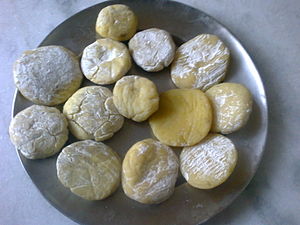
乳製品
ホルスタイン・フリーシアン(HF)種とジャージー種のウシが数十年前にカシミールに導入され、1日あたり400万リットルの牛乳を生産している。かつてはチナーの葉に包まれた有機カシミールバターが一般的であったが、現在ではごく一部でしか販売されていない。

スパイス


カシミール産サフランは、その香気、色、薬効で知られている。パンポール町のサフランは、イラン産がクロシン含有量6.82%であるのに対し、8.72%と superior な品質であるとされている。2020年5月、カシミール産サフランは地理的表示タグを与えられた。スパイスのshahi zeera(帝国クミン、またはブラッククミン)はセリ科に属し、当初はグレズ渓谷のジャングルで見られた。これらの通常の brown zeeraとは異なるダークな種子は、その香り、比較的珍しいこと、形状のため優れたな品質である。
使用されるスパイスには以下が含まれる:
- カシミールチリペッパー(martswangun) — チリはカシミールで地元栽培されている。赤くなると、乾燥させて粉末状にする。粉末の赤唐辛子は、ほとんどの肉料理や一部のベジタリアン料理に使われる、適度に辛い着色料である。味は、ブガム、タンマルグ、バンディポラ、ダンゲルポラ、アナントナグ、ヌールバーグなどの栽培地域によって異なる。ブガムのチリは最も苦味が強く、ヌールバーグのチリは種が少なく、他の地域で栽培されたものよりも辛い。地元政府は、シュリーナガル地区とブドガム地区で栽培されたチリに地理的表示タグを求めている。
- シムラ、パンジャビ、ペプシチリペッパー(martswangun) — シムラ種はスパイシーなqormasを作るのに使われ、ペプシ種は通常インドのラージャスターン州から輸入され、ペプシボトルに似ている。
- アサフェティダ(yangu) — カシミール・パンディット料理の多く、ベジタリアン料理と非ベジタリアン料理の両方に使われる。赤いアサフェティダは、豊かな香りと独特の風味から優れているとされ、特別なカシミール料理のレシピでは、しばしば純粋で混じりけのない形で使われる。カシミール人詩人アガ・シャヒド・アリはこのスパイスの愛好家で、ブルックリンのアパートでyanguの雲の中から現れることで知られていた。
- カルダモン(nich auleh) — 莢を砕いて得られる種子は、yakhean、qaliyaなどのカレー、またkahwahやsheer/noon chaiなどの茶に使われる。
- ベイリーフ(tej pata) — カシミールでは米のpolavやビリヤニ料理に最も一般的に使われる。
- ブラックペッパー(marts) — 果実と種子の両方が使われる。
- シナモン(dalcyn) — 通常カシミールのほとんどの料理に使われ、kahwahチャイの重要な材料でもある。

Ratan jot(アルカネット)はカシミール・パンディットによって料理に色を付けるために使われる。 - フェンネル(bodiyana) — kulchaなどのパン作りにしばしば使われ、食後にそのまま提供される。粉砕したアニスシードは、ほとんどすべてのカシミールシチューに使われる。
- ジンジャー(shaunth) — 乾燥粉末の形で、ほとんどすべてのカシミール料理に使われる。
- タマリンド(tambar)
- ターメリックパウダー(lader) — インド料理、特にカシミール料理で最も広く使われているスパイスの一つである。カレーに黄色い色を与えるが、この目的のためにサフランの代わりにしてはならない。なぜなら、この二つはほとんど共通点がないからである。
- サフラン(kong posh) — 揉み砕いた雌しべをひとつまみ加えるだけで、料理に色と甘苦い味を与えるのに十分である。
- クミンシード(safed ziur) — bhat haakhを除くほとんどすべての料理、ベジタリアン料理でも非ベジタリアン料理でも重要なスパイスである。
- キャラウェイシード(krihun ziur/zureh)
- コリアンダーシード(danival) — カシミールでは、乾燥した形と丸ごとの種子の両方で使われる。ピクルスやvari(カシミール・ガラムマサラ)を作るのに不可欠である。
- ニゲラシード(siyah dana)
- フェヌグリークシード(bresta) — 魚料理、vari作り、ピクルス作りに使われる。
- 乾燥フェヌグリークの葉(hoechh mith)
- ナツメグ(zafal)
- メース(jalvatier)
- 重曹(phul)
- キュウリ、マスクメロン、スイカ、カボチャの殻をむいた種子(char magz)
- 乾燥砕いたミントの葉(hoekh pudana)
- 乾燥ニンニク(rohan)
- 乾燥エシャロット(pran)
- バリ・マサラケーキ — haakh、gogjee nadur、ほうれん草、コールラビ、razmah gogjee、魚、shikaar(狩猟肉)など、多くの料理の素早い風味付けに使う。
- 銀箔(varak) — プーラオや肉料理の飾り付けに使われるティッシュのように薄い食用銀箔。
岩塩の摂取はカシミールでは古くから行われている。それは、紀元前326年にアレクサンドロス大王の軍隊によって初めて発見されたパキスタンのパンジャーブ州のケウラ地域から、かつても今も輸入されている。独立前は、岩塩はムガルロードを経由して輸入されており、この道はムガル帝国時代以前にはNamakルートと呼ばれていた。分割後、その供給は禁止された。しかし、その利点のため、現在では人口のほぼ4分の1が摂取している。
季節ごとの名物

春は、長く厳しい冬の後の再生の季節と見なされることが多い。カシミール人が非常に好むピクニックは、食べ物をテーマに計画される。田園地帯は、アーモンド(badaam)、モモ(tsunun)、サクランボ(gilaas)の白い花やピンクの花で一面を覆われる。カラシナ畑は、明るい黄色の花でその光景に加わる。ナシ(tang)の花は、厚い花の clusters で識別できる。アンズ(Tser)の花は白色で、しばしばピンクや赤みを帯びた色合いをしている。それらは晩春から初夏にかけて咲く。豆類は春野菜である。サクランボは晩春から夏の果物である。コリアンダー(danival)は、涼しい地域では春から夏にかけて多くなる涼しいハーブである。ニンニク(rohan)は主に春から秋にかけて見られる。メロン(kharbooz)は春と夏に栽培される果物である。春のやわらかいhaakh(コラードグリーン)はkaanulと呼ばれる。

レンコン(nadur)の収穫期は9月に始まる。サモワールが片隅で沸騰し、サフランとカルダモンの甘い香りが空気中に広がる。小麦粉、バター、砂糖で作られ、ケシの実がまぶされたクッキー状のkandi kulchasは、お茶に浸して楽しまれる。ダルゲート地区では、プラタナスの木陰で男たちが釣りをする。タンポポの葉は、カシミールではhaandとしても知られ、徒歩で採取される。田舎に行くと、イネが鎌で刈られ、その後乾燥させるために巨大な山に積まれているのが見られる。クリは消えかけの炭火で焼かれる。球根ニンニクと赤ジャガイモが場所を取り合っている。プルワマ地区の一部であるパンポールでは、満開のサフラン畑が出迎えてくれる。丘陵地帯に向かうと、トウモロコシとクルミの木が実を結び、収穫の準備をしているのが見られる。北カシミールのソポレや南カシミールのショピアンといったリンゴの生産地に向かうと、リンゴのカートンが国内の様々な地域に輸送されているのが見られる。
長い冬の間は日が短く、日差しや電気が不足しているため、興味深い食べ物以外に生活を活気づけるものはあまりない。そのため、それはカシミール人の生活の主要な関心事となっている。窓辺やテラスでは、ナス、チェリートマト、ヒョウタン、カブの小さな山が天日干しされているのが見られる。時間もたっぷりあり、薪を一つの入り口に入れた2つのコンロ(カシミール語でChaer)を持つdaan(カシミールの伝統的なストーブ)は、電気の不足にもかかわらず、長時間の調理にいつでも対応できる。大雪で村の道路がすべて閉鎖され、村人が石油ランプや灯油ランタンを使わなければならないとき、家族全員が台所に呼ばれ、一晩中煮込んだshab degの香りが空間いっぱいに広がる。コールラビ(monje)は寒さに強く、冬の間も畑で育ち続け、少々の霜もその成長を助けるほどである。
料理一覧
注目すべきカシミール料理には以下が含まれる:
バーベキュー

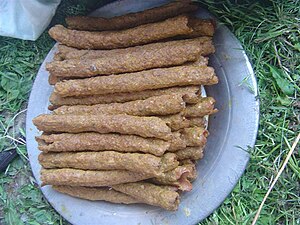

ケバブの起源の一説として、トルコの兵士たちが初めて肉の塊を直火で焼いたというものがある。カシミールのケバブは地元の香辛料で調理され、ディップが添えられる:
- ケバブ:串に刺して焼いたり揚げたりした、味付けした挽肉。シェフのグラーム・ナビ・ダル(別名「ビッテ・ワゼ」)によると、ケバブ用の肉はまず非常に鋭いナイフで刻み(アシェ・オ・クトー)、次に卵、クミン、カルダモン、ニンニクを加え、ペースト状になるまでさらに刻み、その後1mの長さの串に刺して翌日温め直される。
- コクール・ケバブ:鶏肉のケバブ。
- ラハブダル・ケバブ:ラハビ/モアチ・ケバブとしても知られています。伝統的に中央が窪んだ舟形に成形された挽肉を、カードベースのマイルドなスパイシーソースで煮込む。柔らかくなった肉は、卵と、タマネギ、赤唐辛子粉、ナツメグ、ガラムマサラ、ショウガ、ニンニク、コリアンダーを含む少なくとも9種類の調味料とスパイスに一晩漬け込まれる。通常はヨーグルトを添えて供される。
- コクール・ラハブダル・ケバブ・ルワンガン:鶏肉のケバブを濃厚なトマトソースで煮込んだものである。
- シャミ・ケバブ:ワズワーン風の羊肉のパティで、ひよこ豆、卵、マイルドなカシミールスパイスを使用している。
- チャンプ:ラムチョップ。
- ナドゥール・マウンド:カシミールのハッシュブラウン。レンコン、ショウガ、ミントのパティに、様々なカシミールスパイスを少量加えたものである。
- ブジス・チャマン:ヨーグルト、クリーム、アニスでマリネしたパニールを焼いたものである。カシミールの美しい森を彷徨う詩人が野外でこの料理を作ったと言われている。
- ブジス・ガード:カシミールスパイスでマリネした炭火焼き魚。
- ブジス・オラヴ、ツール、マーズなど:丸いオーブンで焼く土鍋のカンギールは、卵、ジャガイモ、豆、肉塊などの食品を焼くオーブンとして機能する。
- タリ・ガード:黒胡椒、クミン、カシミール唐辛子でマリネして浅く揚げた魚。
- タリ・コクール:フライドチキン。
- トゥジ:カシミール赤唐辛子とアニスパウダーでマリネし、完璧にバーベキューされた肉。
- ガード・トゥジ:魚のケバブ。
- チャマン・トゥジ:カシミール風にマリネしたカッテージチーズの塊を串に刺してバーベキューし、チャツネを添えて供される。
- チャープ・マーズ:ソーセージ
- カリーン:羊の頭、頭蓋骨など、全体を覆う厚い膜を粗く刻み、スパイスと最小限の液体で弱火で数時間煮込んだものである。
朝食
一般的なカシミール人にとって、朝食は通常、地元のパン屋の焼きたてのパンと一杯のヌーンチャイ(塩茶)を意味する。パンはどの季節でも朝食にありますが、その付け合わせは変わる。手頃な価格の贅沢品には以下のようなものがある:

- 「ハリサ」。専門の料理人「ハリサグユル」によって作られる「ハリサ」は、人気の肉料理で、朝食として食べられる。特別な地下オーブンで24時間香辛料と一緒にゆっくりと調理され、手でかき混ぜられる。良い「ハリサ」は、骨抜きにしたマトンを細かく刻み、地元の米、フェンネルシード、シナモン、カルダモン、塩と混ぜ合わせる。弱火で少なくとも6〜8時間煮込み、沸騰したスモーキーなマスタードオイルと少量の牛乳を注ぎながら、木製のマッシャーでかき混ぜ続ける。小さなケバブが添えられ、またフェヌグリークで調理された少量の子羊の腸(メティ)と、風味付けされたオニオンリングも添えられる。この料理は非常に美味であり、18世紀のアフガン支配時代にこの地を訪れたあるアフガンの総督は、食べ過ぎて死んだと信じられている。
- 「ハリサ・ザフラニ」は、カシミールサフランが振りかけられている。アリ・カダルのある職人は、この独特の料理で知られている。
- 「ルーシーとハルワ」は、キール・バワニ聖地の外のルーシー職人によって作られる。
- 「マカイ・ワス」は、挽いたトウモロコシの粉を調理したものである。米が栽培できない未灌漑の高地にある村々では、主食として食べられていた。
- 「ガエル・ヴグラ」は、菱の実の粉の粥である。これらの菱の実や水牛のナッツは、カシミール語で「ガエル」と呼ばれる。それらは、特に有名なウーラー湖の岸辺など、多くの場所の浅瀬で育つ。インドでもこれらの菱の実は育ちますが、一般的にサイズが大きく、水分が多く含まれている。通常、撹拌したヨーグルトを水で薄めたもの(「グルス」)と一緒に食べられる。
- 「ヴシュキ・ワス」は、大麦/jaの粉の粥である。米やトウモロコシが簡単に入手できない、または栽培されていないカシミールの丘陵地帯のいくつかの村では、主食として調理される。
ワズワーン料理
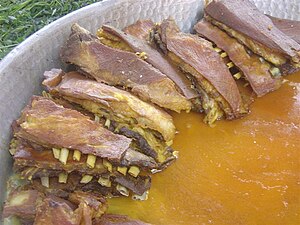

ほとんどのインド亜大陸の料理が、火にかけて調理する際に食材に風味を加えるのに対し、ワズワーンの風味は、まだ未調理の状態で味付けされた水を加えたり、味付けされた水に浸したり(浸透)することによって加えられる。
- タバックマーズは、ギーで煮込んだアバラ肉で、艶やかな肉の間に甘い脂が挟まっている。カシミール・ヒンドゥー教徒は一般的にこの料理をQabargahと呼ぶ。これはカザフスタンから伝わったようで、そこではパンディットの名前であるQabargahとして知られている。Qabargahは弱火で長時間煮込まれ、その後非常に素早く揚げられるのに対し、タバックマーズは塩とニンニクで茹でられ、わずかに弾力のある食感が特徴である。
- Tang ta lahabi kababは、カシミール産ナシとマトンケバブの丸ごとで、しばしばトマトヨーグルトグレービーと一緒に供される。
- Waaza kokurは、サフラングレービーとマイルドなカシミールスパイスで調理された鶏肉の丸ごと。
- Safed kokurは、ホワイトソースで調理された鶏肉。
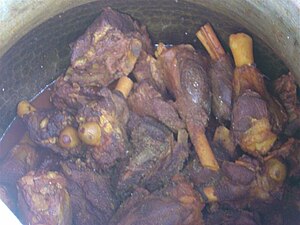
ダニ・ファウル - Aab goshは、dodhe maazとも呼ばれる。スパイスとギーで弱火で調理された有名な牛乳ベースのカレー。10リットルの純粋な牛乳を1リットルに煮詰めてからマトンと混ぜる。
- Methi maazは、乾燥フェヌグリーク(methi)の葉を含むスパイスミックスで風味付けされたマトン腸。
- Waazeh hedarは、カシミールワズワーン風マッシュルーム。
- Marchwangan kormehは、スパイスとヨーグルトで調理された肉で、主にカシミール赤唐辛子が使用され、辛い味が特徴である。
- Kokur marchawangan kormehは、赤唐辛子グレービーで調理された鶏肉。
- Aloobukhar kormehは、乾燥プラムで調理された挽肉。
- Badam kormehは、クリーミーなアーモンドグレービーで調理された柔らかいマトン片。
- Danival kormehは、コリアンダーまたはパセリで調理された子羊肉。
- Kokur danival kormehは、凝乳ベースのグレービーで調理された鶏肉で、サフランと新鮮なコリアンダーで風味付けされている。
スープ
- Tsatt/maaz rass:風味豊かな香辛料と塩で味付けしたマトンの小片入りマトンストック。
- Channa rass:簡単に作れるヒヨコマメのスープ。
国内の肉の煮込み料理


Shab Deg(塊肉入り) Shab Deg(ミートボール入り) 
Rogan josh 
Yakhean Gogjee Ta Maaz(カブとマトン) - Shab Deg:カブと肉/アヒル/鶏肉/牛肉、ひき肉の団子を一緒に調理し、一晩煮込んだ料理。
- Dani:肉汁で煮込んだ骨髄。
- Matschgand:赤唐辛子で味付けした肉汁で煮込んだ子羊のミートボール。肉の形(丸ではなく細長い形)と肉汁の色が非常に重視される。
- Methi matsch’':茹でて潰すかペースト状にしたフェヌグリークの葉とマトンのミートボール。
- Matsch ta tser:子羊の細切りとアンズ。アンズが黄色く、ひき肉が赤いため、食卓に並べると非常に色彩豊かで美しい料理。
- Olav bokhara barith matsch:プラムを詰めたひき肉のミートボール。
- Mith ta golemach:フェヌグリークとひき肉のミートボール。
- Matsch ta phul gupi:ひき肉の子羊の細切りとカリフラワー。
- Matsch ta olav:ジャガイモと子羊の細切り。
- Tser kofta:アンズを中に入れたひき肉のミートボール。
- Nadir ta maaz:ハスの茎とマトン。
- Nadir, oluv ta maaz:ハスの茎、ジャガイモ、マトンを弱火で煮込み、ガラムマサラとキャラウェイシードでとろみをつけた料理。
- Maaz vangun:ナスと肉。
- Kokur aloobukhar korma:カシミール産の材料で乾燥プラムと一緒に調理した鶏肉。
- Palak ta kokur:ほうれん草と地鶏。
- Gand ta kokur:鶏肉と玉ねぎのカレー。
- Kokur ta torreil:鶏肉とヘチマ。
- Bam chunth ta maaz:マルメロと子羊。
- Gogjee-aare ta maaz:乾燥カブと子羊。
- Gaazar ta maaz:ニンジンとマトン。
- Bote-tser maaz:子羊と干しアンズ。
- Haand ta kokur:タンポポの葉と鶏肉。
- Haand ta maaz:乾燥タンポポと肉のカレー。授乳中の母親のための古いカシミール地方のレシピ。
- Haakh maaz:マトンと一緒に調理したカシミール風のサグ。
- Woste haakh ta maaz:緑/赤の葉と子羊。
- Monje ta maaz:カシミール風のコールラビとマトン。カシミール人はコールラビを食べるだけでなく、その葉も必須である。
- Gole al syun:カボチャと子羊。
- Torreil ta maaz:ヘチマとマトン。
- Monje qaliya:コールラビとマトン。
- Rogan josh:子羊をベースにした料理で、たっぷりのカシミール唐辛子(乾燥粉末)、ショウガ(粉末)、ニンニク、タマネギ、またはアサフェティダで味付けした肉汁で調理される。肉汁は主にカシミール地方のスパイスとマスタードオイルがベースである。サフランとアサフェティダが大量に使われていることから、ペルシャと中央アジアの影響が明らかであり、これらはペルシャのお気に入りの調味料であり、ムガル帝国は料理人にこれらを常に供給するためにインド亜大陸でこれらの植物を栽培した。カシミール地方のイスラム教徒はプラーン(ある種のシャロット)、ニンニク、ケイトウの花を着色料として使用する。コラムニストのヴィル・サングヴィは、これを世界で最も有名なインドカレーに選出している。
- Kokur roghan josh:ケイトウの花の肉汁とカシミール地方の調味料で調理したフライドチキン。
- Hindi roghan josh:タマリンド入りのローガン・ジョシュ。
- Vunth roghan josh:過去20年間、イード・アル=アドハーの際には、ムハンマドが聖なる機会にほとんどラクダを犠牲にしたという伝統に従い、ラクダの肉が販売されている。
- Pachi roghan josh:赤い肉汁で煮込んだ足。
- Yakhean:ターメリックや唐辛子粉を使わないヨーグルトベースのマトン肉汁。この料理は主に月桂樹の葉、クローブ、カルダモンの種子で味付けされている。これはマイルドで繊細な料理で、ご飯と一緒に食べることが多く、より辛い副菜が添えられる。Yakheanはアクバルの治世中にカシミールで知られるようになった。ヨーグルトベースの肉カレーはペルシャ料理の一部であり、皇帝が1586年に併合した際にこの調理法を新しい州に導入した。
- Kokur yakhean:カシミール地方のハーブで味付けしたヨーグルトで調理したジューシーな鶏肉の小片。
- Shyaem:ヨーグルトで調理したひき肉のカツレツ。
- Kokur shyaem:ヨーグルトで調理した鶏肉のカツレツ。
内臓と屑肉
- Chuste:ヤギの腸のスパイシーなドライカレー。
- Naihkala ta phendeir yakhean:羊またはヤギの内臓の特定の部分をヨーグルトで調理したもの。
- Chhagael yakhean:羊またはヤギの睾丸をヨーグルトなどで調理したもの。
- Damin yakhean:トライプのヤクニ(ヨーグルトカレー)。
- Bokavachi chhagael:ヤギまたは羊の腎臓と睾丸。
- Charvan:羊またはヤギの肝臓をサイコロ状に切って調理したもの。
- Choek charvan:ヤギまたは羊の肝臓をサイコロ状に切った酸っぱいもの。
- Charvan oluv:カレー風味の肝臓とジャガイモ。
- Kalle maaz:ヤギの頭肉。

グシュタバ
ミートボール
ワザたちは、適切な切り方と肉を完璧にひき肉にする技術を学ぶために何年も訓練される。伝統的に、子羊の肉はクルミの木で叩き潰される:
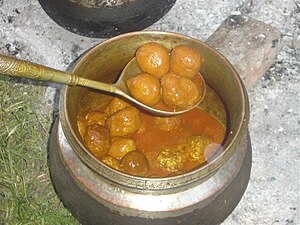
- Goshtabeh:ひき肉のマトンのミートボールをスパイスとヨーグルトのグレイビーで煮込んだもの。カシミール地方では「王の料理」としても知られ、宴会の最後の料理である。ジャワハルラール・ネルーはかつてこれを「肉のカシミール」と名付けました。伝説的なボリウッド俳優ユスフ・カーンことディリップ・クマールは、Goshtabehを最も愛していたと言われている。1955年12月、当時のジャンムー・カシミール州首相であったバクシ・グラーム・モハマッドと、ソビエト共産党第一書記であったニキータ・S・フルシチョフが、Goshtabehをお互いに食べさせ合っている象徴的な写真に収められた。
- Beef riste:牛肉のリステ
- Beef goshtabeh:25パーセントの脂肪を含む粉砕した牛肉をパルプ状の塊になるまで叩き、味付けをしてからミートボールの形に整える。その後、味付けした熱湯に浸し、牛乳とビーフストックで味付けしたよく攪拌されたヨーグルトの泡立つ熱いスープに入れ、半固形の濃度になるまで調理する。元のレシピでは非常に脂肪の多い水牛肉を使用しており、慣れていない人にとってはかなりの挑戦となる。
- Palak riste:通常、小さな「リスタ」が4個と、ほうれん草の葉が数枚、「トラエム」に盛られて4人の客に提供されます。
- Safed riste:ゴシュタベーのミートボールが最も大きく、次にリスタとパラク・リスタのミートボールが最も小さいで
菜食の副菜
カシミールでは大量の野菜や森林産物が生産されます。伝統的な料理は以下の通りです。

- Dum olav/Dum aloo:ショウガ粉、フェンネル、その他の辛いスパイスで調理されたジャガイモ。最も熟練を要するのは、揚げたジャガイモにグレイビーやソースが吸収されるように穴を開け、ジャガイモをスポンジ状にして複数のジャガイモの層の風味を高めることである。
- Wazel aelwa:主に村で調理される忘れ去られたジャガイモのレシピ。
- Matar olav:ジャガイモとエンドウ豆のカレー。白米(batta)と定期的に組み合わせられる定番の副菜であるす。
- Olav dude legit:ヨーグルトで煮込んだジャガイモ。
- Gande te matar:タマネギとエンドウ豆。
- Gande te hemb:インゲン豆とタマネギのグレイビー。
- Boda razmaah ta olav:インゲン豆とジャガイモ。

ドゥム Phul Gupi(カリフラワー)。 - Razmah hemb ta vangan:フレンチビーンズとナス。
- Band gupi ta tamatar:トマトと調理したキャベツ。
- Nadir palak:ハスの根とほうれん草。これは大規模な宴会やディナーで提供される副菜である。
- Ranith bam chunth khanji:調理したマルメロ。マルメロはカシミール人にとって非常に人気のある果物です。昔はdaans(粘土製のオーブン)で焼かれていた。残った燃えさしによる穏やかな熱で美味しくなったとされる。
- Bam chunth vangun:マルメロとナス。
- Bam chunth nadir:マルメロとハスの茎。
- Dued vangan:ヨーグルトとナス。
- Karel ta vangun:カシミール風のkarela baingan(ゴーヤとナス)。
- Al lanej ta vangan:カボチャの葉とナス。
- Tsounth vangan:青リンゴのカレー。リンゴとナスは両方とも細長くスライスして揚げられます。油はアサフェティダ(yangu)と通常のスパイスで味付けされる。リンゴが甘い場合は、レモン汁を数滴加える。この甘酸っぱいリンゴとナスから作られる甘酸っぱい一品は、秋が谷に訪れると人気である。
- Choek vangan-hachi:新鮮な野菜の代わりに日干ししたナス。
- Gole al doon gooje:カボチャとクルミ。
- Gande dued:揚げタマネギを牛乳と混ぜたもの。
- Hoch haand:乾燥タンポポの葉を茹でてペースト状に挽いたもの。
- Ruwangun hachi:乾燥トマト。
- Monje Haakh:コールラビは珍味である。
- Dum Monje:コールラビ(karam/gaanth gobhi/kohlrabi/ドイツカブ)をヨーグルトで煮込んだもの。
- Dum Phul Gupi:カリフラワーを自身の水分で調理したもの。
- Phul Gupi Olav:カリフラワーとジャガイモ。
- Haakh:wosteh haakh(アカザ)、heanz haakh、sotchal(ゼニアオイ)、kretch(ヤグルマギク)、haand(タンポポ)、obuj(スイバ)、lissa(ヒユ)など。コラードグリーンはカシミール人に好まれ、カッテージチーズ、マトン、鶏肉と一緒に調理する独自の調理法がある。
- Nunnar:スベリヒユ。
- Bhat haakh:Sabz Haakhとも呼ばれる。Bhatはカシミール語でパンディットを意味します。ハークはカシミールで誰もが食べるが、カシミール・パンディットの特産品である。
- Dagith haakh:マッシュしたコラードグリーン。
- Gogjee haakh:少量のアサフェティダを加えたカブの葉。冬の条件下でよく育つ丈夫な葉物野菜で、地元料理に不可欠な食材である。マスタードオイル、クミンシード、芳香なスパイスを混ぜ合わせることで、独特のブレンドの風味を料理に与える。
- Wapal haakh:オニナベナの葉(Dipsacus Inermis)。
- Wosteh haakh ta zombre thool:アカザと固ゆで卵。
- Haakh nadir:コラードまたはケールとハスの根。
- Haakh ta olav:ジャガイモと青菜。
- Haakh vangan:コラードグリーンとナス。
- Sotchal nadur:ゼニアオイ(Malva Parviflora)は、道端、公園、遊び場、放牧地など、どこにでも見られる野生の野菜である。この植物に関する最古の記述は、西暦1世紀にギリシャの作家ペダニウス・ディオスコリデスによって書かれたとされている。この料理は老若男女問わず好まれているが、特に外国市場での入手が限られているためである。
- Sotchal vangan:ゼニアオイの葉とbaigan。この料理はsotchalとthool-vanganから作られる。Thool-Vanganは完全に成長しきっていない小さなナスである。柔らかくて肉厚で、種がほとんどない。
- Mujji mulivian:マッシュした大根の葉のカレー。
- Mujje patar ta vangan:大根の葉とナス。
- Zamutdodh cuar:弱火で絶えずかき混ぜて調理するヨーグルトカレー。
- Olav bum:カシミールの池や湖で一般的に見られるジャガイモとスイレンの植物で調理される美味しいドライ料理。
- Bandh roghan josh:本格的なスパイスとヨーグルトを融合させて煮込んだキャベツで、ローガンジョシュの菜食版の「兄弟」とされる。
- Nadir roghan josh:ハスの根をnadurが柔らかくなるまで弱火で煮込んだもの。
- Cshte gogjee:カブ
- Cshte mujji:茹でて軽くスパイスを効かせた大根。
- Cshte band gupi:茹でて軽くスパイスを効かせたキャベツ(アサフェティダ入り)。
- Choek nadir:酒石酸(tatri)を加えたハスの根。
- Choek mujji/mujji kalaa:タマリンドペーストを加えた長い大根。
- Choek al:タマリンドを加えたウリ。
- Al yakhean:ヒョウタンをヨーグルトベースのグレイビーで煮込み、カシミールの調味料で味付けしたもの。
- Hedar yakhean:キノコのヤクニ。
- Nadir yakhean:ハスの根をヨーグルトで煮込んだもの。
- Nutree yakhean:ソヤチャンクのヤクニ。
- Karel yakhean:下準備したゴーヤをヨーグルトでグレイビーが濃くなるまで煮込んだもの。
- Vangan yakhean:揚げナスをヨーグルトで煮込んだもの。
- Pudna al:カボチャとミント。
- Torreil ta vangan:ヘチマとナス。この野菜は夏に採れ、甘みがあり、調理が非常に簡単である。
- Torreil ta tamatar:ヘチマとトマト。
- Variphali olav:辛いレンズ豆の団子が入ったジャガイモカレー。この料理はパンジャブ地方のものであるが、カシミール人にも非常に好まれている。
キノコ

ヒマラヤ山脈の麓が原産のGuchhiまたはkanaguchhiキノコ(学名モリーユ属、他地域では一般的にモリーユとして知られる)は、カシミールだけでなく国際的にも、特にヨーロッパ料理において非常に珍重されている。ごく限られた実験的な成功を除けば、(kana)guchhiまたはmorelsの大規模栽培の試みは成功しておらず、消費は野生のキノコの収穫に依存している。その結果、これらのキノコはすべての菌類の中で最も高価なものの一つであり、インドでは1キログラムあたり最大30,000インドルピーの費用がかかる(2023年現在、約€330/kg、またはUS$350/kg)。
伝統的または有名な料理には以下が含まれる:
- Kanaguchhi yakhean:豊富なヨーグルトのグレイビーで調理されたモリーユ。
- Kanaguchhi matar masala:地元の人々が採集した美味しいモリーユが詰まった、まさに風味の爆弾。
- Guchhi Ver:カナグッチー(アミガサタケ)と伝統的なカシミールのスパイスミックスを使った珍しい料理で、独学のマスターシェフであるスマン・カウルが調理したものである。
- Shajkaan:別名カンパパー(ジオポラ・アレニコラ)キノコで、タマネギやトマトと一緒に炒めたり、牛乳で調理されることもある。
’’Tschaman
パニールはカシミール語でtschamanと呼ばれる。味付けは甘味と塩味の範囲に属し、これはクミンシードやコリアンダー粉のような素朴なスパイスに加えて、シナモン、メース、クローブを多く使用することを意味する。山岳地帯では新鮮なショウガが不足しているため、粉末ショウガが主要なスパイスとなっている。パニールのレシピは以下の通りである。
- Tschaman Kanti、カッテージチーズのキューブを揚げ、厳選されたスパイスと和え、タマネギとトマトと一緒に炒めたもの。
- Lyader Tschaman。lyadurはターメリックがあるため黄色を意味し、Tschamanはカッテージチーズである。「イエローグレービー」という言葉は、9種類のスパイス(そのうちのいくつかは丸ごと)を青唐辛子と一緒に重ね、水で煮込んでから牛乳でソースを濃くすることで得られる複雑な風味を適切に表現できないかもしれない。イギリス系インド人シェフのRomy Gillはそれを「黄金色の美味しさのボウル」と呼んだ。
- Veth Tschaman、またはVozij Tschamanとしても知られている。これはローガン・ジョシュに相当する。
- Ruwangan Tschaman、トマトグレービーに入ったカッテージチーズ。
- Palak/Haakh Tschaman、カシミールの食材を散りばめたほうれん草ベースのグレービーで調理されたカッテージチーズ。
- Mith Tschaman、パニールとフェヌグリーク。
- Mith Tschaman Ta Niul Kara、パニールとフェヌグリーク/jaとグリーンピース。
- Matar Tschaman、ターメリックマタール・パニール。伝統的に、パニールは揚げることになっている。
- Torreil Ta Tschaman、ヘチマとパニール。
- Tschaman Monje Qaliya、コールラビとパニール。Mehendiraatでは大きなDegchisで作られていた。
- Kanaguchhi Tschaman、カシミールモレルとパニールを酸味のあるグレービーで。
- Gogjee-aare Ta Tschaman、干しカブとカッテージチーズ。
- Tschaman Vangan、パニールとナス。
チャツネとライタ
カシミール・ワズワーンの影の裏側と呼ばれ、料理に本当の色を加える。カシミール人が外食したり、食事を詰めたりするときには、無料で提供されることになっている。スパイシーなスプレッドの種類は以下の通りである:
- Zamut Dodh、自家製ヨーグルト。
- Muj Chetein、ヨーグルトと大根の和え物。すりおろした大根とヨーグルトを、少量のローストクミンで味付けしたユニークなブレンド。ライタのカシミール版。
- Doon muj chetein、クルミと大根のライタ。
- Zeresht Chetein、バーベリー
- Anardan Chetein、乾燥ザクロの種(anardanaと呼ばれる)とコリアンダー、ミントの葉を使って調理される。
- Zirish Chetein、クロスグリ
- Aelchi Chetein、サワーチェリーに少量の塩を加えたもの。
- Gordoul Chetein、サワープラムのチャツネ
- Pudna Chetein/Buran、青唐辛子と新鮮なミントで作られた軽いチャツネ。
- Ruwangun Chetein、トマトを青唐辛子と油でソテーし、ほとんどの水分が蒸発するまで煮詰めたもの。
- Ruwangun Haech Chetein、セミドライトマトのチャツネ。
- Martswangun Chetein、すり鉢で挽いた青唐辛子のチャツネ。
- Rohani Chetin、ニンニクと赤唐辛子のチャツネ。
- Kishmish Chetein、レーズンの調味料ソース。
- Chounth Ta Danival Chetein、リンゴとコリアンダーのチャツネ。
- Aloo Bukhar Chetein、新鮮なプラム、タマネギ、砂糖、ライムジュース、スパイスで作られる。
- Muj Chetein(バリエーション)、マスタードオイルでソテーしたすりおろし大根。
- Buzith Nadir Chetein、ローストレンコンのチャツネ。
- Buza/Foata Vangan、ローストまたは茹でてマッシュしたナスをカードと混ぜたもの。
- Dodh Al/Al Raita、ユウガオをヨーグルトで和えたもの。
肉の炒め物
- Mutton/Chicken Kanti、骨なしの小さなマトンまたはチキンをマリネし、新鮮なタマネギ、トマト、青唐辛子で軽く揚げる。
- Matsch Barith Karel、ニガウリにラムのひき肉を詰めたもの。
- Matar Machh、グリーンピースとマトンのひき肉。
- Sotchal Charvan、ゼニアオイの葉とレバー。
- Hedar, Chhagael, Bokavachi, Ta Krehnamaz、キノコと睾丸、腎臓、肝臓(羊またはヤギ)。
- Talith Kaed、ヤギまたは羊の脳のフライ。
- Kaed Pakora、脳のフリッター。
魚
シュリーナガル市のSoura近郊にあるアンチャル湖では、古くからのシャドーフィッシングが地元でTchaayi Gaadとして知られている。漁師たちは早朝にボートを漕ぎ出し、凍った湖面を破ってモリで魚を捕らえる。彼らは毛布や藁で作った即席の傘の下に隠れてボートの隅に影を作り、魚を引き寄せて、近づいてくる魚をモリで突き刺す。昔の湖岸にはヤナギの茂みが点在しており、その影に夏の間魚が避難していたため、地元の漁師たちは魚を捕らえるのが容易であった。一般的な魚料理は以下の通りである:
- Nader ti Gaad、イード、ナウルーズ、ガーディー・バッティ(カシミール・パンディットの祭り)などの祝日に調理される珍味で、レンコンと共に調理された魚(ビロース、ゾブ、インディアン・メジャー・カープ、カトラ、ロフ、マルガリータ、マフシール、スノートラウト、ナイジャー、チュシュ、クロント、チュルなど)。
- Mujh Gaad、大根と好みの魚を使った料理。
- Haak Gaad、カシミールほうれん草で調理された魚のカレー。
- Gada Ta Gogjee/Monjje/Band Gupi、カブ、コールラビ、またはキャベツと共に調理された魚。
- Gaad Ta Chounth、青リンゴと共に調理された魚。
- Gaad Qaliya、黄色いグレービーの魚。
- Ruwangan/Tamatar Gaad、トマトグレービーで繊細に調理された白い川魚。
- Kong Gaad、サフランの花と魚。
- Gaad Leij、伝統的なカシミール様式で調理され、nadurなどの野菜と共に提供されるマス。
- Gaad Ta Obuj、魚と野生のobuj(ギシギシ)。
- Hogada Ta Haakh/Bum、乾燥魚(ボリナオなど)と'karam'菜または乾燥スイレンの茎。
- Kanz Ta Gaad/Guran、魚または小魚、または非常に小さな乾燥魚を、わずかに発酵させたが非アルコール性の飲み物sadre kaenzと共に調理したもの。昔は、近所の家族がkaenzを作ると、必要なときにいつでも残りの家族も同様に使えるものと理解されていた。この人気料理の唐辛子やショウガ粉のような惜しみなく使われるスパイスの辛さは、このライスビールのような醸造物の冷却効果によって和らげられることになっている。
- Fari/Phari、燻製魚。シュリーナガルのティプロー・モハッラにあるごく一部の残された家庭でのみ、特定の方法で調理される冬の珍味。使用される魚はSchizothorax属に属するマスの一種である。
- Phari Ta Haakh、燻製魚とコラードグリーン。燻製魚の皮は剥がれ、赤褐色になるまで揚げられる。魚はコラードグリーンに加えられ、すべての水分が吸収され、油が浮いてくるまで調理される。蒸しご飯と一緒に食べるのが最適であり、再加熱しないのが一番である。
サラダ
- Salaad、スライスしたキュウリ、トマト、ニンジンの野菜を同心円状に飾り付けた皿。レモンを絞ったものを添える。
- Razmah Salaad/Chat、キドニービーンズのサラダ。
米

カシミール人はジャンムー地方の人々よりもはるかに多くの米を食べる。
- Batta、蒸した白米。
- Buzz Batta、チャーハン。
- Wazul Batta、妊婦向けの栄養価の高い赤米のスナック。
- Taayi Batta、カシミール風のフライパンで焼いたご飯。
- Gucchi Polav、黒モレル入りカシミール・プラウ。
- Matar Polav、エンドウ豆(生または冷凍)を加えたシンプルなご飯のバリエーション。
- Tahaer、黄色いご飯。パンディットが縁起の良い機会に用意するが、ムスリムも特定の機会に用意する。
- Khetchar、米と殻付きムング豆で作られ、monje aancharと一緒に食べるのが一番。
- Neni Moonge Khetchar、マトンと全粒緑レンズ豆をマスタードオイルで調理し、バスマティ米と一緒にdumで仕上げたもの。
- Vaer、クルミの粒または羊やヤギの腸が入った塩味のライスプディング。カシミール・パンディットが結婚式や「ヤグニオパヴィット」の儀式の始まりに必ず調理する。
- Mayir、通常バターが分離された希釈したカードで調理された塩味の米プディング。主に農村部で、特に牛の出産後1週間ほど経った喜ばしい機会に用意される。
- Yaji、茹でて蒸し焼きにした塩味の米粉ケーキ。
- Batta Laaye/Mur-murei/Chewrei、ライスムンチー。
- Byael Tomul、残った発酵した新芽の籾種から作られるこの美味しいスナック。天日干しされ、choola(かまど)の上に置かれた土器で焼かれ、冷ましてから木製のすり鉢で砕かれる。殻を取り除いた後、乾燥クルミの粒と塩茶と一緒に食べられる。
パン
- Kinke Tschut、鉄板で焼いた全粒粉の無発酵フラットブレッド。
- Parott、バター風味のフラットブレッド。カシミールのスーフィーの聖地では1キロのパラタが提供される。著名なシェフのサンジーブ・カプールは、かつてはルマリ・ロティを作っていたが、これほど大きなパラタは作らなかったと述べている。
- Puer、揚げて膨らませた小麦粉の小さな丸いケーキ。温かく提供され、野菜料理や甘い料理と一緒に楽しまれる。
- Tschur Tschut、通常朝食のチャイと一緒に食べられるスパイシーなライス・クレープ。
- Zyur Tschut、この香ばしいパンケーキは米粉、クミン、青唐辛子から作られる。
- Tomul Tschut、米粉で作られたロティ。
- Dranna、米パンのパン粉。
- Makai Tschut、コーンフラワーのチャパティ。
- Gyav Tschut、名前が示す通り、たっぷりのギーで作られ、ローガン・ジョシュと一緒に提供される。
- Makai Woer、コーンフラワーで作られ、お茶と共に楽しまれる午後のパン。
- Gari Tschut、クワイ粉で作られたパン。
- Gari Puer、クワイ粉を揚げた小さな丸いもの。
- Vushki Tschut、大麦粉を焼いた丸いもの。
卵
特定の農村地域では、Kanger(火鉢)に卵を1、2個入れる伝統がそれぞれの個人に知られている。Kangerで調理されている卵の香りは、卵が調理されたことを知らせる酵素を活性化させるとされている。
- Thool Mond、オムレツ。
- Haak Ta Thool、コラードグリーンと卵。
- Prezdar Ta Thool、クプワラで地元で食べられているフォックステールリリーと卵。
- Wosteh Haakh Ta Thool、赤ほうれん草と卵。
- Zombre Thool Ta Dal、カシミールの伝統的な赤レンズ豆(masoor)とゆで卵の料理。
- Thool Zambur、カシミール風卵カレー。
- Gogjee-aare Ta Zombre Thool、干しカブとゆで卵。
- Zombre Thool Ta Ruwangan Hachi、ショウガ、ニンニク、青唐辛子を使ったトマト煮込みの目玉焼き。

Markhor (capra falconeri).
野生鳥獣肉(shikaar)

推定によると、カシミール地方の湿地では、平均して毎日50〜60羽の鳥が捕獲されている。捕獲された野生鳥獣肉(shikaar)は通常すぐに調理されない。調理のために解体する前に数日間吊るす(faisander)必要がある。吊るすことで肉が柔らかく、繊維質が少なくなり、より美味しく食べられるようになる。
イギリス領インド帝国では、Markhor(ネジ角ヤギ)が最も難しい狩猟種の一つと考えられていた。これは世界最大の野生のヤギである。地元では最も美味しい野生肉と見なされている。
インドイノシシは、ドーグラーの軍人であったグラブ・シンによってヒマラヤ地域に導入された。その肉はドーグラー族やシク教徒にとって素晴らしい珍味であったが、1947年以降、イスラム教徒が多数を占める地域ではその数が減少し始めた。
野生鳥獣肉料理は以下の通りである:
- Pacchin Dumpokhta、オナガガモ。カシミールの冬の料理の王様と呼ばれ、普段鶏肉を食べないカシミール・パンディットに好まれる珍味である。この渡り鳥はアヒルのように見えるが、高速で飛ぶことができる。冬になるとカシミールの湿地にやってくる。油で揚げて辛いスパイスで調理される。輝く青みがかった金色の羽の下の肉は硬いが美味しく、体を温める効果がある。
- Batook Palak、アヒルとほうれん草。
- Batook Ta Zamut Dodh、カードカレーに入ったアヒル。
- Gogji Ta Batook、カブとアヒル。秋(harud)のアヒルは風味豊かである。柔らかいアヒル肉とカブの素朴な甘さのこの組み合わせは、Dumとして知られる崇高な煮込み料理に象徴される、この地域の料理の腕前を反映している。カシミールの冬の体に優しい食べ物である。
- Shikar Rogan Josh、マガモ、ガチョウ、チドリ、シギ、クイナ、コガモ、ウズラ、オナガガモ、ヒドリガモ、ライチョウ、ヤマウズラ、キジ、ホエジカ、ハンガル、アンテロープ、野生のヤギなどの狩猟鳥や狩猟動物のローガン・ジョシュ。
- Shikar Ta Nadeir、狩猟鳥の肉をレンコンと共に調理したもの。
- Shikar Ta Haand、乾燥タンポポと共に調理されたアヒルやマガモ。

豆
カシミール・パンディットの中で菜食主義であり、タマネギやトマトさえも食べなかった人々は、Dal Battas(ダール・パンディット)として知られていた:
- Dal Nadur、インゲンと一緒に煮込んだレンコンのダル。
- Vaari Muth Dal、ブラックタートルビーンズ(カシミールのVaari Muth)。
- Vaari Muth Gogjee、ブラックタートルビーンズをカブと一緒に調理したもの。
- Razmah Shab Deg、伝統的な鍋料理のベジタリアン版で、肉の代わりにキドニービーンズを加えたもの。
- Razmah Dal、ショウガとフェンネルの粉末という伝統的なカシミールのスパイス風味の赤いんげん豆のシチュー。
- Razmah Gogjee、キドニービーンズをカブと一緒に調理したもの。
- Gogji aare ta Razmah、カブの輪切りを、すりおろしショウガとフェンネルシードで風味付けしたクリーミーなrajma ダルと共に、弱火でゆっくりと煮込んだもの。
- Razmah Hemb、様々なインゲンを柔らかい莢と一緒に調理したもの。
- Dal Dabbi、牛乳とスパイスで調理された伝統的なレンズ豆料理。
- Channe Baegle、カシミール渓谷原産の乾燥したbaegle ダルは、冬に特に好まれる。
- Razmah Nadur
- Thool Razmah Yakhean、ヨーグルトに入った緑色のキドニービーンズ。
- Vangun Hachi Ta Moonge Dal、乾燥ナスとムング豆。
発酵食品
様々な種類のカシミールピクルスは以下の通りである:
- Aanchar、ピクルス(鶏肉、マトン、魚、ハイイロガン、マンゴー、サクランボ、ニガウリ、アムラ、リンゴ、アンズ、スモモ、ニンニク、カブ、唐辛子、コールラビ、ダイコン、ニンジン、タマネギ、カリフラワー、ナス、レンコン、グリーンアーモンド、硬いナシ、ブドウ)。
ストリートフード

- Makai Waet、焼きトウモロコシ。
- Buzith Gaer、焼きクワイ。行楽客は熱い焼きナッツの小山を囲んで座り、大きい石と小さい石の2つの石を使って、これらを一つずつ叩き割り、中身を取り出す。
- Monje Guel、クワイの実のフリッター。カシミール語ではmesaまたはgaer guelとも呼ばれる。
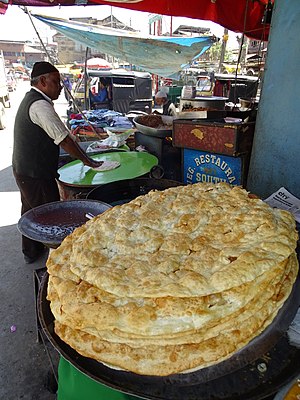
Puer (pooris), 巨大なパン。 - Tandoori Chicken、Afghani Chicken、Chicken Lemon、シュリーナガルのカヤムの様々なストリートフード。
- 揚げたKababs。
- Mutton Keema Samosas、Chicken Keema Samosasなど。
- Alla Posh Mond、カボチャの花のフリッター。
- Olav Mond/Monjivor、ショウガ入りのポテトパティ。
- Doel Chetin、土鍋に入ったチャツネで、様々な野菜(キャベツ、タマネギ、ミントなど)が入っている。
- Tillae Karrae、ひよこ豆または乾燥グリーンピースを衣で覆って揚げたもの。
- Mongh Masale、蒸し黒豆に塩と赤唐辛子粉を混ぜて温かく提供される。
- Matar、カシミール人のストリートフード。
- Chunth Pakori、衣をつけ揚げた青リンゴのサクサクスライス。
- Vangan Pakori、ひよこ豆粉をまぶして揚げたナス。
- Olav Churma、フライドポテト。
- Gand ta Palak Pakori、タマネギとほうれん草をスパイス入り衣に浸して揚げたもの。
- Kruhun Masale/Dub Maha、貧しい人々のシャワルマ。精製小麦粉で作られた薄いLavasに茹でひよこ豆を巻き込み、トマトチャツネに浸したもの。
- Razmah Masale、トウモロコシ入りrajma。
- Masale Tschot、Lavas(カシミール風ナン)の上に広げられたひよこ豆のマサラ。masaalを作る準備は夜間または早朝に始まる。その後、様々な種類のチャツネやソースが用意される。大根チャツネに新鮮なカード、青唐辛子、コリアンダー、コショウ、塩を混ぜたものが添えられ、最後に柔らかいパンで包む。
- Egg Roll
- Dastar Katlam、有名なHalwaiの食べ物。
- Tobruk Halweh Parothe、ハルワを添えた揚げたpoori。

- Jalgoz、ピーナッツ。
チーズ
カシミール渓谷の遊牧民の羊飼いであるGujjarsとBakerwalsは、季節の移り変わりに応じて乳牛の群れと自身の居住地を山間を上下に移動させている:
- Maesh Crari、カシミールのモッツァレラチーズと称される。円盤状に整形されたチーズに唐辛子、ターメリック、塩をまぶし、マスタードオイルで揚げると、外側はカリッと黄金色になり、内側は柔らかくクリーミーな状態になる。
- Kudan、珍しいグッジャール族のヤギチーズで、パニールに似ているが、よりもろく、フェタチーズに近い。Kudanはバカルワル族のテントで、鍋にマスタードオイルを熱し、塩、ターメリック、唐辛子をkudanのチーズ凝乳と混ぜて作られる。すべてが溶け合って、赤唐辛子の斑点と小さなkudanの塊が散りばめられた黄金色の液体になる。
デザート
カシミール人は砂糖を好む。一般的な砂糖菓子は以下の通りである:
- Halwa、元々は蜂蜜、ラクダの乳、カシューナッツなど多くの材料で作られ、19世紀にペルシャ湾からボンベイを経由して統一インドに受け皿で持ち込まれた甘い菓子。Halwaの伝統は19世紀末にカシミールに伝わった。
- Chounth Halwa
- Barfi、牛乳ベースの甘い料理。
- Khatai、一口ごとに崩れるカシミールの甘いビスケット。
- Khir、ライスプディング。
- Phirin、コンデンスミルクにsojiとレーズン、アーモンド、カシューナッツ、ピスタチオなどのドライフルーツを混ぜ、ローズウォーターを振りかけた甘いプディング。
- Kong Phirin、サフラン風味のライスプディングで、ナッツが添えられている。
- Seemni、バーミセリ・キール。
- Shufta、刻んだドライフルーツ、コショウ粉末、カルダモンなどのスパイスをシュガーシロップで作り、バラの花びらを添えた伝統的なデザート。
- Mitha Kanagucchi、シロップ漬けのモレル茸。
- Kofta Khumani、アプリコットのミンチ。
- Roth、ケーキとパンの中間のようなもので、小麦粉、ギー、ヨーグルト、ケシの実、卵(特別な機会に)、砂糖で作られたこれらの甘いRotiは家庭で人気がある。完璧なrothを焼く技術は、世代から世代へと受け継がれる再学習された規律であると同時に、習得されたスキルでもある。
- Basrakh、小麦粉に少量のギーを加えて作られた甘い珍味。
- Tosha、古くからのカシミールデザート。
- Lyde、全粒粉で作られたカシミールデザート。
- Nabad、土鍋やNaatのような銅製の容器で砂糖を結晶化させ、サッカーボールよりも大きい半球状の固形砂糖玉として彫り出したもの。
- Gulkand、自生するバラ(koshur gulaab)を砂糖漬けにしたもの。この製法ではカシミール産以外のバラは使用されない。砂糖の代わりに蜂蜜をバラの花びらと混ぜることもできる。
- Matka Kulfi、冷たい麺をトッピングしたクルフィ。
- Kesar Kulfi
- Dry Fruit Kulfi
イギリス風ペイストリー
1918年以前、AhdoosのAbdul Ahad Bhatは、オーストリア系スイス人のMichael Nedouがスリナガルで所有するホテルNedou'sでイギリス人パン職人の指導を受けていた。彼はすぐに製パン技術を習得し、当時カシミール人としては初めての小さなベーカリーを開業した。Ahdoosの得意分野はイギリス風の菓子であり、インドがイギリスの支配からの解放へと近づくにつれて、メニューにカシミール料理を追加した。Mughal Darbarは1984年にレジデンシーロードに設立され、それに並行する道には、1972年にGhulam Nabi Sofiによって設立されたJee Ennがある。これらの新しいベーカリーのオーナーやスタッフの多くはAhdoosで訓練を受けている。ペイストリーの種類には以下が含まれる。
- Chicken or Mutton Patty、塩、コショウ、ニンニクで味付けした肉を層状のパフペイストリーで包んだもの。
- Puffs。
- Cream Rolls
- Cream Buns
- Coconut Macaroons
- Walnut Macaroons
- Walnut Tart、カシミールでのクルミの実の入手が容易なため可能となった。
- Walnut Fudge、カシミールのムーンライト・ベーカリーの専売品で、ウリ産の「雪のように白いクルミ」と地元市場産の蜂蜜とデーツが材料に含まれている。
カンダルワン
カシミール渓谷は、そのベーカリーの伝統、すなわち「カンダルワン」で知られている。インド亜大陸のどこにも、これほど多種多様な発酵パンは見られず、カシミール人の食習慣に対する中央アジアの影響を改めて示している。カシミールのダール湖やスリナガル中心部では、ベーカリーショップが精巧に陳列されている。パン職人は、ゴマやケシの実をトッピングした黄金色のカリカリした皮を持つ様々な種類のパンを販売している。
様々な種類の伝統的なカシミールパンには以下が含まれる:
- TsoetとTsoechvor/Tilvorは、ケシの実(ポピー)とゴマ(ごま)をトッピングした、サクサクとした薄い小さな丸いパンである。直径約3インチ、円周約6インチの地元のベーグルで、上半分は柔らかく、下部のクラストはカリカリしている。これは夕方/午後のパンである。
- Sheermal、サフラン風味の伝統的なフラットブレッドで、イランが起源とされる。甘いものと風味豊かなものの両方のバージョンがある。sheermalのパンは通常、対応する線に接する複数の模様で凹凸がつけられている。
- Baqerkhayn(パフペイストリー)、カシミールのバケルハニは、カシミール料理において特別な位置を占めている。見た目は丸いナンに似ているが、カリカリとした層状で、ゴマがまぶされている。通常、朝食時に温かくして食べられる。
- Lavasa、薄い無発酵のフラットブレッドで、マイダ(細かく挽いた小麦粉)で作られた白色である。紙のように薄い水ぶくれのあるナンである。柔らかいものもあれば、カリカリしたものもある。
- Girda、一晩発酵させた生地で作られ、生地のロールを手で平らにし、指の跡を押し付けて縦に線を入れる。Girdaとlavasはバターを添えて提供される。
- Kulcha、ギーのみで焼かれた、小さくて硬く、乾燥した、もろいパンで、通常は丸い形をしている。上部の中心にピーナッツを置いて飾られる。
- Roth khabar、伝統的なタンドールで焼かれ、ドライフルーツで覆われたケーキのような甘いパンである。
ワズワーン

ワズワーン(Wazwan、ks)は、カシミール料理の多品目コース料理で、カシミールが起源である。カシミール文化の独特な要素である。
ほとんどの料理は、子羊肉、牛肉、羊肉を使った肉料理で、少数のベジタリアン料理もある。カシミール地方全体で人気がある。さらに、ワズワーンはカシミール料理フェスティバルや同窓会などで国際的にも提供されている。
すべての料理はハラール基準に従って調理される。ベジタリアンのためには、ドゥム・アルヴェ、ナドゥル(ハスの茎)、ハーク(ケール)、カシミール・ベジタリアン・プラオなどの独特な珍味がある。カシミール・ベジタリアン・プラオは、香り高いカシミールスパイス、野菜、ドライフルーツを混ぜて調理された風味豊かな料理で、豊かで楽しい料理体験を生み出す。
飲料
Noon Chai または Sheer Chai
カシミール人はかなりの量の茶を飲む。カシミール人は「カシミール・チャイ」という言葉を使用しない。「Noon」という言葉はカシミール語で塩を意味する。最も人気のある飲み物は、「ヌーン・チャイ」と呼ばれるピンクがかった色の塩味の茶である。これは紅茶、牛乳、塩、そして重曹で作られる。この茶の独特な色は、その独特な調製方法とソーダの添加によるものである。カシミール・ヒンドゥー教徒は一般的にこのチャイを「シアー・チャイ」と呼ぶ。カシミール・イスラム教徒はこれを「ヌーン・チャイ」または「ナムキーン・チャイ」と呼び、どちらも塩味の茶を意味する。
ヌーン・チャイまたはシアー・チャイは、カシミールの家庭における一般的な朝食の茶であり、Qandur(カシミール語: کاندر、パン職人)から焼きたてのバカルハニなどのパンと一緒に飲まれる。これはカシミールの家庭で最も基本的かつ不可欠な食品の一つである。茶はかつて大きなサモワールで提供されていた。現在では、サモワールの使用は特別な機会に限られ、通常はやかんが使用される。
供される前にアーモンドやピスタチオなどのナッツ類や食用バラの花びらを加えることもでき、時にはマライや生クリームを加えて茶にとろみとコクを与える。
自然のミネラルウォーター
カシミール大学が2022年に行った調査によると、カシミール渓谷にある泉の87%が「優れている」から「良好な」水質であることが判明している。社会の大部分、特に地方や後進地域に住む人々は、泉の水を頼りにしている。多くの村人たちは、聖地との精神的なつながりから、泉の水が最も純粋な水であると信じている。
カシミールで最も古く、最も純粋な泉の一つであるコケルナーグ泉から採れるブリンギ・スプリングウォーターは、高いアルカリ性でミネラルがバランスよく含まれている。
バブリビヨール
「バブリビヨール・シャルバット」は、甘くした牛乳、ローズウォーターまたはルー・アフザ・シロップ、そして地元で栽培された甘いバジルの種を混ぜ合わせた飲み物である。
リアエス
ヨーグルトまたはケフィアから作られるカシミールのラッシー(「リアエス」)は、ヨーグルトを飲む液体状で塩味のある方法である。木製の「チューンプ」またはチャーンを使ってバターミルクを攪拌するプロセスはリズミカルであり、そこには芸術がある。ヨーグルトは正しい方法で攪拌され、バターのような脂肪はきめ細かい泡となって上部に浮かび、スパイスと乾燥ミントの葉はちょうど良い量でなければならない。
サドル・カエンズ
この発酵させた米水飲料は、肝臓の働きが鈍い場合に非常に良いとされている。
シャヒ・シーラ
様々なベリーの果汁を抽出して作られ、ラマダン中に家庭で用意される。1977年のカシミール映画『アーニマール』では、結婚祝いの席でゲストがこの飲み物を飲んでいる場面が登場する。
食べ物と飲み物のペアリング
時間をかけて煮込んだ肉料理で構成される伝統的なカシミールのワズワンは、ウイスキーのスパイシーな風味を高める素晴らしいペアリングである。ロワール渓谷のワイン「サンセール」は、カシミールの「ゴシュタベ」によく合う。熟したフルーティーな赤ワインは、コクのある「ローガン・ジョシュ」によく合う。お勧めのワインはモンテプルチャーノである。
特別な行事と祭り
イード・アル=フィトル
断食中は、イスラム教徒は日中の食事を避けるが、夕暮れ時には、日中に用意された特別で豊かな食事を存分に楽しむ。ラマダン月のメニューには、「カジュール・カ・ラッドゥー」(デーツボール)、「バブリビヨール」(バジルシード)、「クルフィ」、「フィリン」、「シームニ」、フルーツチャット、フルーツカスタード、「カティア」(健康効果の高い飲み物)、そして「ヌーン・チャイ」が含まれる。ゆっくりと煮込まれたマトンの香りが空気中に漂い、魅惑的で官能的であり、スリナガルの予測不可能な馴染み深い雰囲気にもかかわらず、気分は高揚し、通りは「イード・ムバラク」の楽しい挨拶で満たされる。
イード・アル=フィトルは30日間のラマダンの終わりを告げる。モスクやイードガーでイードの祈りを終えた後、家族は家に戻りゲストを迎える。イードの朝の一般的な伝統は、ケーキ、クッキー、ギー・チョット(タンドールで焼いたフラットブレッド)、ペイストリー、チキンやマトンパテのような香ばしいスナックなど、様々なパン類を添えて、ケフワ(サフランティー)とチャイ(ミルクティー)を提供することである。
裕福な家族はしばしば、ケバブ、リスタ(グレービーソースのミートボール)、シャミ・ケバブ、鶏肉片などのワズワーンの選りすぐりの料理を用意する。カンテ(炒め肉)、マトンやチキンティッカなどの他の珍味は、特に義理の息子などの特別なゲストをもてなす際に、ソースやグリーンチャツネ(ダニアチャツネ)と共に提供される。
昼食には米が主食であり、肉を特徴とする様々な自家製料理が添えられる。注目すべき準備はヤクニであり、新鮮なカードとマイルドなスパイスで作られた伝統的な料理で、豊かでありながら繊細な風味を提供する。
イード・アル=アドハー
この日はファジュル(夜明け)の祈りと、「ドード・ケフワ」(ミルク入り緑茶)とパン類での朝食で始まる。祭りが終わる頃には、裕福な家族のほとんどが「ワザス」(料理人)に豪華な食事の注文を入れ始める。これは料理人が自分の場所で調理し、その後、客に販売され、客は自宅で提供する。犠牲となる動物には、デリーワラ種、メリノ交配種、バカルワル種、カシミール種の羊が含まれる。
ハズラット・シェイク・ダーウードのウルズ
信者には菜食のみが提供される。バトマルーとその周辺地域の住民の大多数は菜食主義になり、肉や鶏肉を食べない。彼らは乾燥カブ(「ゴグジ・アーレ」)を広く消費する。なぜなら、ダーウードの時代には、天日干しにしたカブがカシミールの飢饉を乗り越えるのに役立ったと信じられているからである。
ホワジャ・マスード・ワリのウルズ
パンポール地方の人々は、聖人の伝統を守るために、肉以外の乾燥野菜、卵、チーズなどの食料を調理し、親戚や友人を昼食や夕食に招く。
ダスタギール・サハブのウルズ
スリナガルのハニャールとサライ・バラ地域では、信者たちが聖地の外で見られる。そこでは地元および非地元の商業施設が屋台を設置し、カシミールの伝統的な食べ物を販売している。信心深い男性たちは、ナツメヤシや菓子を供えながら、心のこもった賛美歌を歌う。
ラエシュモール・サヘブのウルズ
南カシミールのアナントナグ地区の人々は、16世紀の神秘家への敬意の印として肉食をやめる。この7日間、肉屋が開いていることはめったにない。聖人のウルズの前と後のそれぞれ3日半、人々はタマリンドで煮込んだ大根を食べる。
ヘラス
カシミール・パンディットにとって、シヴァラトリのプージャでの「プラサード」の供物は、米、調理済みのラム肉と魚、そしてその上に丸ごとの生の魚を山盛りにした充電器である。
ハル・ナヴム
アシャド月の9日目、カシミールのパンディットたちは、ターメリック、少量の油、塩で調理した黄色の米を「ツァルヴァン」(ヤギの肝臓)と共に女神シャリカに供物として捧げる。
ナブレフ
カシミール正月であるナブレフの祭りは、「ナドゥル」なしでは不完全である。ペルシャ人やペルシャ文化のノウルーズと混同されがちなこの祭りは、北半球における春の到来を告げるものであり、その日付は変動するが、常に春分の日前後である。
ディアスポラとフュージョン料理
カシミールに住むチベット難民、チベットの小さなイスラム教徒の人口も含む人々が、主に18世紀のハリ・パルバット砦近くの小さな地域にスリナガルに住んでいる。人気の「モモ」(牛肉餃子)の店やチベット料理レストランは彼らの子供たちによって経営されている。チベット料理の選択肢には、広東風チキンや「カムルー」ワンタン、細かく刻んだキノコを詰めて揚げたパスタなどがある。
カシミールのシーク教徒の料理は、タマネギとトマトを使うことでパンジャブの影響を少し受けているが、味付けは「バディヤーン」(サウンフ)などの要素でカシミール風になる。多くのインド人観光客は、もっぱら「ヴァイシュノ・ダーバ」に頼っている。これは渓谷の一般的な非エアコンレストランで、完全菜食の北インド料理を提供する。
調理方法

いくつかのカシミール料理の調理法は次の通りである:
ブランチング
ダンデライオン(「ハアンド」)の茎は、ギザギザの葉とともに4回湯通しして、苦味がないようにする。
対流
伝統的なカシミール料理は、上と下の両側から熱を受け、炭火を使った弱火で最高の仕上がりになる。
ブレイジング
カシミールの「ハーク」の葉は、たっぷりの水でブレイズされる。調理の初期段階で、木べらや大きなスプーンを使って緑色の部分を絶えず押し下げ、水中に浸った状態を保つことが非常に重要である。カシミール料理で広く使われるマスタードオイルは、料理に特別な風味を与える。

クールブイヨン
カシミール料理の多くは、香り高い肉のだしに頼っている。「ワズワン」の主要な技術は、タマネギとエシャロットで作られるこのだしを準備することにある。新しく形作られたミートボール(「リスタ」と「ゴシュタベ」)は、シナモンとブラックカルダモンで風味付けされたこのラムのだしでポーチされ、煮込まれる。
テンパリング
クローブ、カルダモン、シナモン、ベイリーフなどのホールスパイスは油で炒める必要がある。炒めが少なすぎると、料理は香りがなく生気のないものになる。わずかでも炒めすぎると、苦味だけが残る。熱いギーまたはマスタードオイルを上からかけ、揚げた「プラーン」(エシャロット)ペーストとサフランエキスで飾る。
キャラメル化
スライスしたタマネギを黄金色になるまで炒め、少量の水でピューレにする。
乳化
ヨーグルトは脂肪分が多く、とろみがある必要がある。乾燥ミントは、ほんの少しだけ最後に加えて料理をさわやかにする。
着色
関連する料理は、サフランエキス(ローガン・ジョシュやリスタ)またはマワル(乾燥した鶏のトサカの花)によってさらに色が強調される。カシミール唐辛子も、赤色を出すために過剰に加えられることがある。マワルやラッタンジョットが入手できない場合、トマトが誤って代用品として使われることがあるが、カシミールで調理される本格的な料理にトマトが使われることはない。
煮込み
食材がゆっくりとスパイスとともに煮込まれることで、その本来の汁や脂肪が溶け出し、一体となって料理に風味と食感を与える。
発煙点
マスタードオイルを燻製にするのは「ドゥルスト」と呼ばれる処理で、冷ましてから使えるようになる。
ダムクッキング
「シャブデグ」の調理容器は、長い冬の夜の間、弱火で調理される前に生地で密閉される。ダムクッキングは16世紀頃にムガル宮廷によって普及した。
柔らかくする
ミートボール料理である「ゴシュタベ」と「リスタ」は、その独特の食感から渓谷の外ではめったに見られない。羊は屠殺後すぐに、死後硬直が始まる前に肉を叩く必要がある。軽くてふわふわにするために空気を混ぜ込むため、肉は叩きながら折りたたむ工程を経る。
調理器具
料理長(ウスタッド)のナジル・アーメド・アラムによると、鍋の品質は重要であるという。彼は、適切な銅の含有量が必要だと述べている。木材(クルミとリンゴが最適)を使うことも重要である。ガスでの調理とは同じではない。
他の料理との類似点
カシミールとその人々、そしてその物語の伝統と同様に、カシミール料理も中央アジア、ペルシャ、中国、そしてインド亜大陸からの影響の融合である。ある文化から別の文化へと受け継がれた料理のレシピは以下の通りである:
- Aab Gosh (カシミール)。AbgooshtまたはAbgushtは、素朴な食材を使った一品料理で、ペルシャの心温まる料理である。何世紀にもわたってペルシャ人に親しまれてきた。アルメニアにも似た料理があり、ラムの代わりに牛肉を使ったAbgoosht stewと呼ばれる。
- Batte (カシミール)。アフガニスタンでは短粒米、もち米をbataと呼ぶ。
- Harise (カシミール)。Al Hareesは小麦、肉(鶏肉)、塩で作られる伝統的なエミラティ料理である。砕いた小麦を使ったシンプルで伝統的なサウジアラビア料理はjareeshと呼ばれる。アルメニアではHarissaはherisseh、harisa、keshkegとしても知られており、小麦粒と肉の粥である。通常korkotとして知られる小麦は殻が剥かれているため、調理時間が短縮される。ブルンジ料理のBoko Boko Hareesは、鶏肉、ターメリック、ブルグル小麦で作られる珍味である。Amritsari Hareesaはラホール、パキスタンの冬の季節の有名な料理で、小麦と肉で作られる。デジギーで味付けされ、熱いナンと一緒に提供される。
- Kabab (カシミール)。トルコ語のkebapはアラビア語のkabaab(焼いた肉)に由来する。東セム語の語源は「燃やす」、「焦がす」、「焼く」を意味すると思われる。バビロニア・タルムードでは、寺院での供物はkabbaba(「燃やされたもの」)であってはならないとさえ教えている。有名なモロッコの旅行家イブン・バットゥータは、西暦1200年にはすでにkebabがインドの王族の日常食の不可欠な部分であったと述べている。アダナケバブ、ウルファケバブ、イスケンデルケバブなど、世界で最も美味しく風味豊かなkebabsのいくつかはトルコの南東部の州から来ている。ドネルケバブはブルサに住んでいたイスケンデル・エフェンディによって発明され、肉を垂直に吊るしてグリルした。イランの街中で見られる最も人気のあるkabobsの一つはkabob koobidehで、ラムのひき肉または牛肉、あるいはその両方を組み合わせたものである。アフガンのチャプリケバブの伝統的な調理法は揚げることである。
- Kahwe (カシミール)。アフガンの主要な茶であるkahwahは、マイルドで香りがよく、レシピは家族ごとに異なる傾向がある。
- Katlam (カシミール)。伝統的なトルコ語のQatlamaは「折られた」を意味し、動詞のqatlamaq(折る)に由来する。シンプルなkatmerはトルコの白チーズとトルコ茶と一緒に食べられる。トルクメニスタンでは、牛乳と卵を混ぜた小麦粉から焼かれるパンの一種がある。これはkatlamaと呼ばれる。アゼルバイジャンでも調理され、様々なハーブが加えられる。揚げたカザフのパンKattamaは中央アジアで非常に人気がある。Katamaはキルギスのタマネギ入り渦巻きフラットブレッドである。ウズベキスタンでは、katlamaは自家製バターを添えて提供される日曜日の朝の伝統的なパンである。Qatlamaは砂糖またはシュガーシロップをトッピングしたアフガンの揚げた甘いペイストリーである。Qator GambirまたはGambirはモンゴルのパンケーキで、他の料理を作る際に余った生地から作られる副産物であることが多い。Kutlumaはカリカリとしたバター風味の食感の層状のパキスタンのフラットブレッドである。
- Kulche (カシミール)。アフガニスタンとイラン北東部では、これらの乾燥パンビスケットはkulcha-e-khatayeと呼ばれる。イラン料理のKoloochehはシナモン、砂糖、砕いたクルミを詰めたクッキーである。
- Lavas (カシミール)。lavashという言葉は初期のトルコ語の文献に繰り返し見られる。Lavashは小麦粉、水、塩で作られたトルコのパンである。温かくても冷たくても食べられる。この紙のように薄い毛布サイズのパンはアルメニアで最も古いパンの一つであり、現在でも作られている。アゼルバイジャンでは、lavashは伝統的なオーブン(tandir)だけでなく、サジ(火を下に置く大きな凸状の鍋)でも焼かれる。アゼルバイジャンとイランでは、夫婦の繁栄を願って花嫁の肩に乗せられたり、頭の上に砕かれたりする。
- Luchi (カシミール)。非常によく似たベンガルのluchaiは揚げた膨らんだパンである。
- Nabad (カシミール)。ペルシャ語のNabatは、サフランの小片が入った、比較的大きな砂糖の結晶で構成される菓子鉱物の一種である。
- Nadur (カシミール)。アフガン料理では、Qormah e Nadrooはラム肉または仔牛肉、ヨーグルト、レンコン、コリアンダーを使ったタマネギとトマトベースのシチューである。
- Polav (カシミール)。pilafは10世紀以降のある時期にイランで発明されたように見える。トルコ人はシンプルな米をsade pilavと呼ぶ。トルコではpilavを主菜ではなく主に付け合わせと見なす。イランは香り高いdomsiyah 米で作られるpolosで有名である。最も特徴的なものは、サクランボ、マルメロ、アンズなどの果物をベースにしている。中央アジアでは、最もシンプルなレシピはタマネギ、肉、ニンジンを使用する。ムガル料理学校の贅沢な宮廷料理の伝統により、インドは非常に手の込んだpulaosの本拠地となっている。インド西部の労働者がピラフをカリブ海にもたらし、そこではバター、アーモンド、ピメントを詰めたグリーンオリーブで飾られている。
- Roth(カシミール)。普遍的な西アジアおよびヨーロッパの甘い卵パンのアフガン版はrotと呼ばれる。アフガニスタンでは、生まれたばかりの子供が40日になったときに伝統的に提供される。
- Sheer Chai (カシミール)。QaimakまたはSheer chaiは、アフガニスタンの祝賀会で健康を祝うためにしばしば提供される。
- Yakhein (カシミール)。Patates Yahniまたはギリシャのポテトシチューは伝統的なギリシャのレシピで、ladera(オリーブオイルのみで作られ、他の脂肪を加えない料理)のカテゴリーに属する。トルコのYahniは寒い天候に最適なビーフシチューである。19世紀の料理本のメフメット・カミルは、合計14の古典的なyakhnisをリストアップしている。Yakhni nokhodは肉、エンドウ豆、ジャガイモ、タマネギ、塩、ターメリックを使用する伝統的なシラージ料理である。
- Dam Olav (カシミール)。ベンガルのalur domは、タマネギ、トマト、スパイスで作られた軽くスパイスの効いた、少し甘いポテトカレーである。
カシミール料理の作法
カシミール人は陽気で分かち合うことを好む。言語と食は、この地域のアイデンティティの2つの重要な部分である。「正しく食べる者が国を統治する」と言われている。カシミールには、新婚夫婦が一緒に「ロティ」を作るという興味深い結婚の伝統がある。花嫁は生地を平らにして鉄板に乗せ、新郎はそれをひっくり返して火が通っていることを確認する役割を担う。カシミール人は料理の味に非常にこだわりがある。食通は一口食べただけで、それを調理した「ワザ」(シェフ)を簡単に言い当てることができる。彼らは4種類のナスの中からカシミール産のナスを嗅ぎ分け、教えてくれる。映画監督のヴィヴェック・アグニホトリが、ベジタリアン・ワズワンのアイデアを提案する傲慢なツイートを投稿した際、ソーシャルメディアは自発的な抗議で沸騰した。また、ミシュランの星を多数獲得しているシェフでテレビパーソナリティのゴードン・ラムゼイは、カシミール人から彼の「ローガン・ジョシュ」の肉の切り方やグレービーが間違っていると批判を受け、批判の矢面に立たされた。

カシミールでは、食べ物は味も見た目も良くなければならないと言われている。その香りは食欲をそそるものでなければならない。食事の成功は、目、鼻、そして舌への魅力にかかっている。家にお客様を招くような些細なことから、割礼や結婚式のような大きなことまで、あらゆるイベントは、最も美味しいごちそうを準備し、並べ、提供し、一緒に消費する祝宴となる。珍味は隣人に渡され、楽しまれ、隣人の台所から食欲をそそる匂いが漂ってきて鼻がくすぐられても、何かをねだることに何の恥じらいもない。
床には巨大な「ダスタルカーン」(白い布)が敷かれ、その上に食事が供される。その上の料理がどんなに質素であっても豪華であっても、「ダスタルカーン」は常に温かいもてなしと陽気さの中心であった。カシミールでの大きな夕食会には、通常100人から500人が招待される。反乱とその結果としての暴力と流血以来、食事はさらに大きな意味を持つようになり、それぞれの食事が生命そのものの祝祭を意味するようになった。スリナガル市の特定の地域に店を構える「ワザス」(サマルカンドの料理人の子孫)が、カシミールにおいて重要な政治集団を形成していることは特筆に値する。
カシミール人は食べ物との親密な関係を信じているため、すべての料理は手で食べられる。精神的で宗教的な老婆ですら、食事が終わってから耳の軟骨や骨髄の骨を噛み砕き、すべてをターリーの上に山積みにすることに何の躊躇もない。誰も眉一つ動かさない。カシミール人は、食べ物の種類や追加の盛り付けを断ることを失礼だと考える。追加の盛り付けを断ると死ぬと誓って、説得するためにかなりの努力をする。
食べ物に関することわざ
カシミール語にはことわざや慣用句が豊富である。食べ物に関する慣用句には以下が含まれる:
- Adyav kheyiv chinih adyav kheyiv taki — 半分の人が大皿から食べ、半分の人が小皿から食べた。ひどく準備された夕食のこと。
- Akh chhiwyov masah byak hakah rasah — 一人はブドウの汁で酔い、もう一人は野菜の汁で酔う。富める者も貧しい者も、誰もが傲慢さを抱いている。
- Akh duda biyi maji kyut toak — 招かれざる客が、自分だけでなく母親のためにも(toak)一皿分を要求する。Toakはかつてカシミールで一般的に使われていた土の皿である。貧困や珍味を味わいたいという欲求から、物乞いや招かれざる人々が客の中に押し入ることがあった。これは、快く提供されたものに満足せず、さらに多くを要求する人に適用される。
- Apih hund gyav — 愚かな女のギー。気取った人。カシミール人は、裕福な人もそうでない人も、新鮮なギーを髪に塗っていた。
- Batah gajih ruhun — パンディットの炉にあるニンニクのように、あなたの存在は私にとってそのようなものだ。ヒンドゥー教徒の祖先は、宗教に専念していたため、媚薬効果のあるニンニクを食べなかった。
- Batook Poth — batook poth(アヒルの尻)を食べたというのは、カシミール語でよく話す人の表現である。
- Chaanis haakhas chha paakuk haajat — あなたのhaakhはしっかり煮込む必要がありますか?あなたのhaakhはとても繊細で、ほとんど調理時間がかからないという意味で、皮肉な賞賛の一種である。
- Chaantis animu mathun — おかゆで口を油まみれにする。ただ恥ずかしさのために飢餓を隠すこと。
- Chayi tani ya gani magar tech gachi cheyn — お茶は、薄くても濃くても、熱いまま飲むべきだ。
- Dali Baate ti Khoji thool — パンディットにはダル、コジャには卵、彼らが好きな種類の食べ物。
- Doori doori marts meethan, nishi nishi naabad tyathaan — 遠くから見るとコショウは甘く、近くにありすぎると砂糖は苦く感じる。
- Hardas gurus metras, sontah gurus shetras — 秋のバターミルクは友人のために、春のバターミルクは敵のために。したがって、秋の牛乳の方が質が良い。
- Hari tang tah zulahnai, muhuri tsont tah zulit — ナシがたった1カウリー硬貨の価値しかなければ皮を剥くべきではないが、リンゴが1ソブリン硬貨の価値があれば皮を剥くべきだ。カシミールの原住民はめったにナシの皮を剥かないが、リンゴの皮は常に剥く。リンゴの皮は消化しにくいと彼らは言う。
- Haruch gugaj tah Laruch gunas chhih barabar — 6月のカブとラル地方のヘビは等しい。原住民はどんな理由があっても6月のカブは食べないが、Gunasは主にラル・パルガナで見られる丸頭のヘビで、その噛みつきは一般的に致命的である。
- Majji bhatee — 母親が作った食べ物が最高の食べ物だ。
- Phata Wangun — 破裂したナス、文字通り、自分のためにならないほど賢すぎるずる賢い若者。
- Rogan o zafaran az Pampur, sag az Latapur brinj az Nupur; barrah az Nandapur. Puttu o mahi az Sopur; mong az Kralapur. Arad az Khampur. Shir az Shadipur. Angur az Repur — ギーとサフランはパンポール、野菜はラタプール、米はヌプール、ラムはナンダプール、pattuと魚はソポール、ダルはクララプール、小麦粉はカンプール、牛乳はシャディプール、ブドウはレプール。
- Talwe peyi na tangah — 天井からナシが落ちてくることを願うのは無駄な希望だ。
- Chaki pechni ras, yath poshi tas — 誰かが通常持っていないものについて自慢し続けるとき。
- Khar kya zani zaffran kya gow — ロバはサフランの味を理解できない。
- badhshah saab khar ne khewan zab, yeli poras teli kheyi zab — 通常、食べ物を受け入れない感謝しない人に対して言われる。
Sustainable consumption
Kashmiri women would previously take extra mutton dishes by packing them in old newspapers or plastic bags that they would carry. With time, this tradition became popular, and men soon began travelling with the remaining mutton on their traem (wazwan copper dish). In Kashmir, taking leftover food into carrying bags evolved into a movement, and people also granted it social legitimacy. Even the elites have joined the cause and begun providing specially made carry bags of leftover food. Even the leftover rice is not wasted in marriage functions and is served to animals (dogs, cattle etc.).
In Kashmir, a now-abandoned practice would use green Chinar leaves in packaging delicate things like mulberry, butter, mutton and cheese. This would help these easily contaminable items to stay nontoxic till consumption.
関連項目
参考資料
| この記事は、クリエイティブ・コモンズ・表示・継承ライセンス3.0のもとで公表されたウィキペディアの項目Kashmiri cuisine(10 June 2025, at 22:16編集記事参照)を翻訳して二次利用しています。 |

